Youth Ministry Games
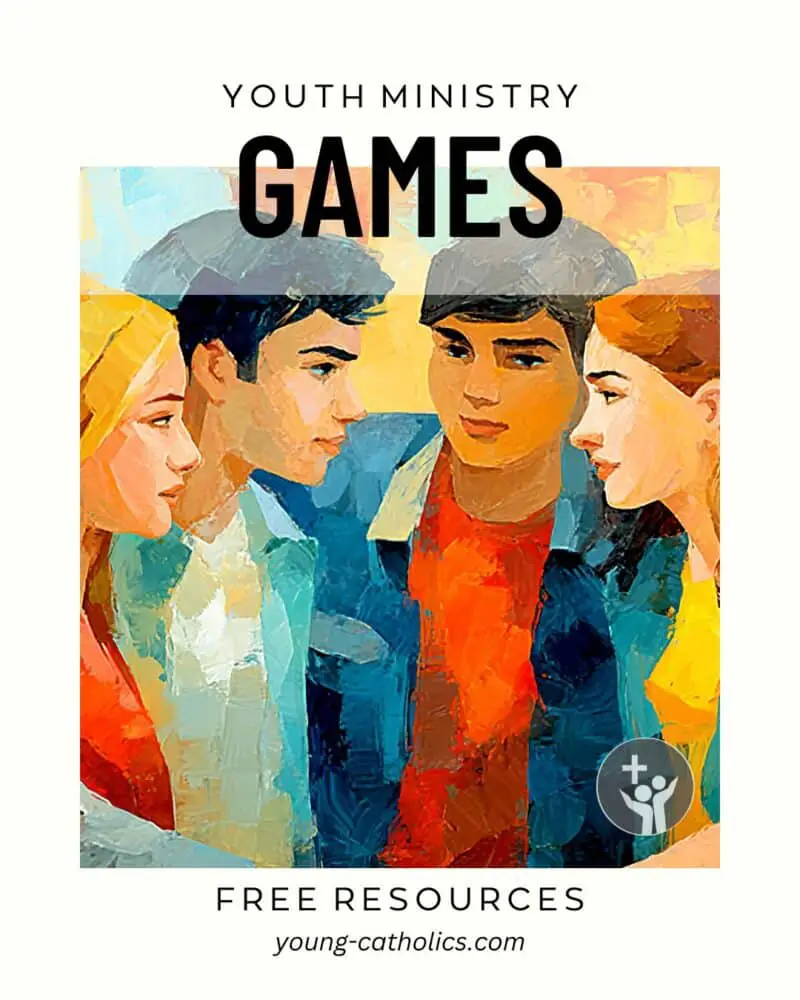
Games help youth feel welcome, have fun, and build friendships. They are a great way to start a gathering or give the group a break. Games bring energy and joy to your youth ministry, VBS, or church camp. They also help teens and kids connect with one another.
Each game on this page is easy to learn and easy to set up. Some need no supplies at all. Others use simple materials like paper, markers, or water. All of them are designed to work well with groups of different sizes and ages.
These games also connect to faith. Many teach lessons about listening, trust, teamwork, or grace. Some help youth think about the Bible, the sacraments, or God’s love. You can use these games to help teach and share the faith in a fun way.
Use these games to make your time with youth meaningful and fun. Try one as an opener, a break between lessons, or just to laugh and build community. Keep this list handy for your next event or gathering.
- Getting to Know You
- Relays and Races
- Team Building
- Food Games
- Active Games
- Knowledge and Teaching Games
- Just for Fun
- Games for Specific Holy Days, Seasons, and Holidays
See the full collection of games for youth below.
Getting to Know You
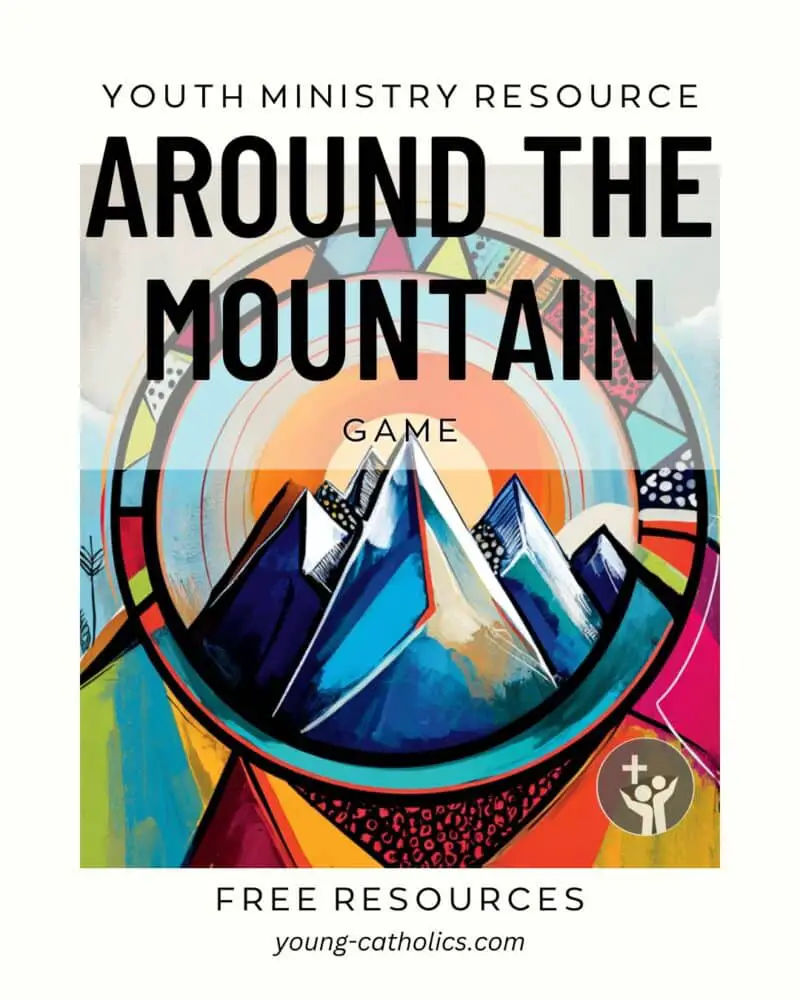
Around the Mountain
Around the Mountain is an icebreaker game for youth ministry. Players move if a statement fits them, then try to find a new seat. One person ends up in the middle, ready to ask the next question. This keeps the game fast, fun, and full of energy.
The game helps youth learn about each other in a simple way. It can be tied to themes like calling, listening, and trust. It also shows how God calls each of us by name. This makes it a good fit for retreats, small group meetings, or any time youth gather.
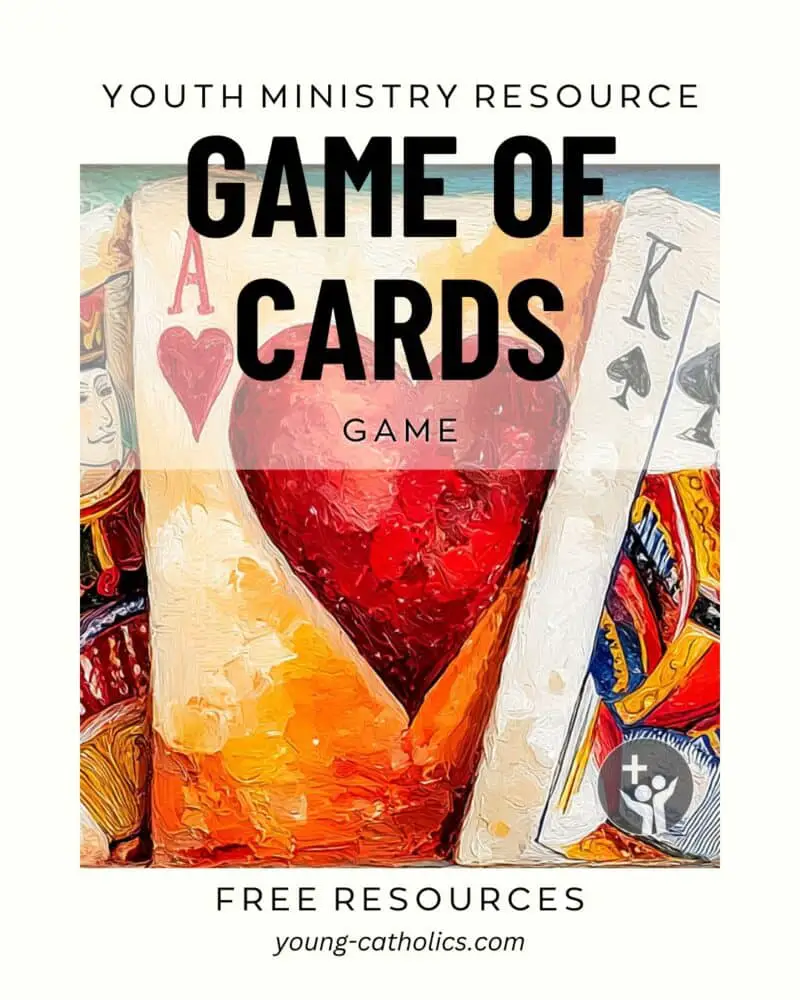
Game of Cards Icebreaker
Game of Cards is a simple icebreaker that helps youth get to know each other. All you need is a deck of cards. Players get grouped based on poker-style hands, like four of a kind or flush. Once in small groups, they share a few facts about themselves, such as their name, school, or a fun fact. After a few minutes, a new hand is called, and everyone forms new groups.
This game works well with large or small groups and helps youth feel more relaxed. It encourages talking and builds trust in a fun and low-pressure way. It fits youth ministry themes like fellowship, community, and inclusion. It is a good way to start retreats, core team meetings, or small group nights. It helps everyone feel more comfortable before diving into deeper faith discussions.
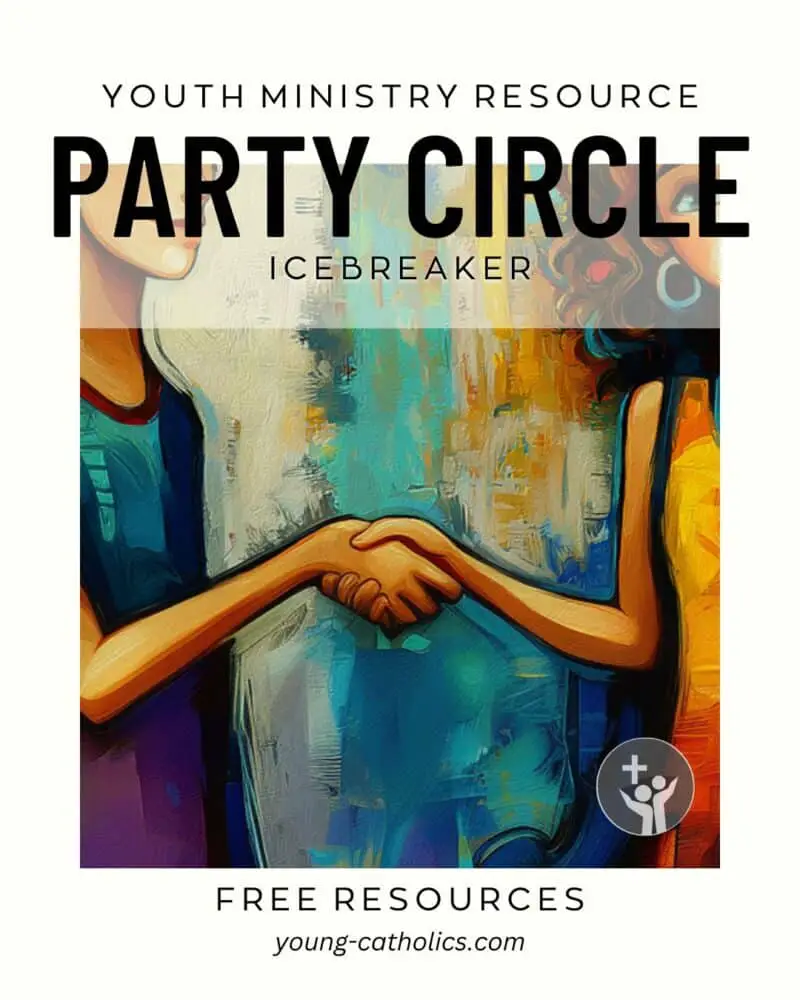
Party Circle Icebreaker
Party Circle is a fun name game that helps youth get to know each other. It is similar to Duck Duck Goose but with introductions and silly actions. One person, the host, walks around the circle and picks someone. They say their names three times while shaking hands or waving. Then they both move around the circle in a funny way like skipping or hopping. When they meet on the other side, they say “Nice to meet you” three times and race back to the empty spot.
This game helps break the ice, especially when there are new people in the group. It encourages laughter, movement, and name learning. It works well at the start of a youth night or retreat. It supports youth ministry themes like welcome, joy, and fellowship. It helps create a space where everyone feels seen and included.

Lost on a Deserted Island Icebreaker
Deserted Island is a talking game where each person picks one item to have if they were stuck alone on an island. They explain what they would bring and why. The item must be something they own and cannot help them escape. This helps the group learn about each other’s likes, needs, and values. It also builds confidence in speaking and listening.
This game works well with youth ministry themes like trust in God, gratitude, and detachment. It can lead to good talks about Bible stories like Jesus in the desert or the Israelites in the wilderness. Youth reflect on what really matters and how God provides. It’s a simple way to grow in faith and friendship.
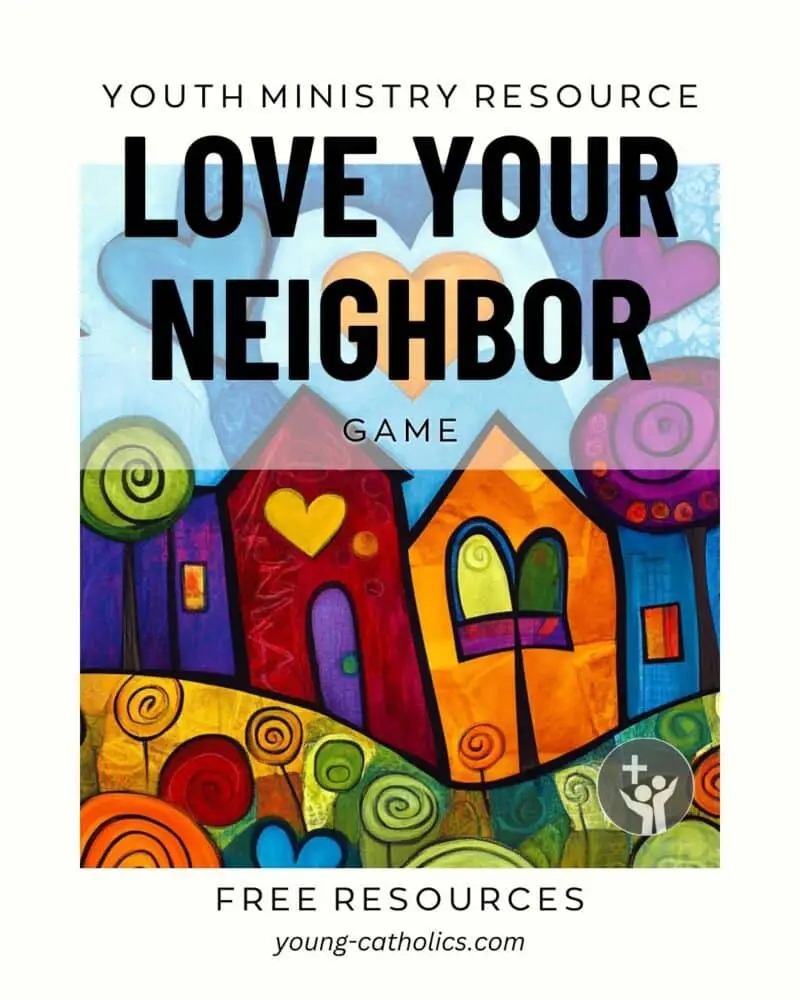
Love Your Neighbor
Love Your Neighbor is a fast and fun icebreaker game that gets youth moving and laughing. Players sit in a circle with one person standing in the middle. The person who is “It” asks someone, “Do you love your neighbor?” That person can either say “Yes” or say, “No, but I love everyone who…” and name a trait. Everyone who matches that trait must switch seats. The person left without a chair becomes the next “It.”
This game helps youth learn about each other and feel included. It works well with themes like loving others, inclusion, and building community. It connects to Jesus’ command to love your neighbor and reminds youth that faith involves action. The game also teaches listening and awareness while creating a joyful and welcoming space. It’s a great way to start a youth night, retreat, or small group gathering.
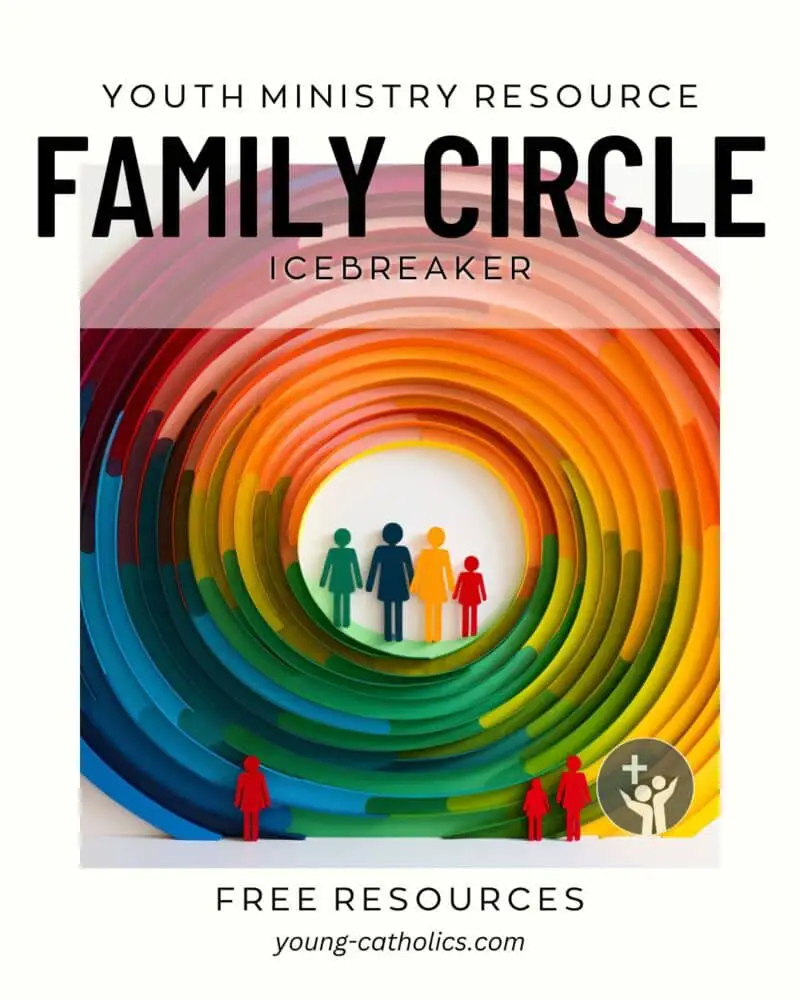
Family Circle Icebreaker
Family Circle is a group game that helps youth build stronger connections. Each person writes their favorite thing from a chosen category on a slip of paper. These are mixed up and read out loud without names. One player, the Head of Household (HOH), guesses who wrote what. If the guess is right, that person joins their “family.” The goal is to bring everyone into one big family by remembering favorites and making good guesses.
This game works well with youth ministry themes like unity, respect, and the value of each person. It encourages listening, teamwork, and kindness. It helps break down walls and create a sense of belonging. The game also supports lessons on empathy and seeing others as part of God’s family. It’s a great way to start group time, especially when focusing on community and relationships.
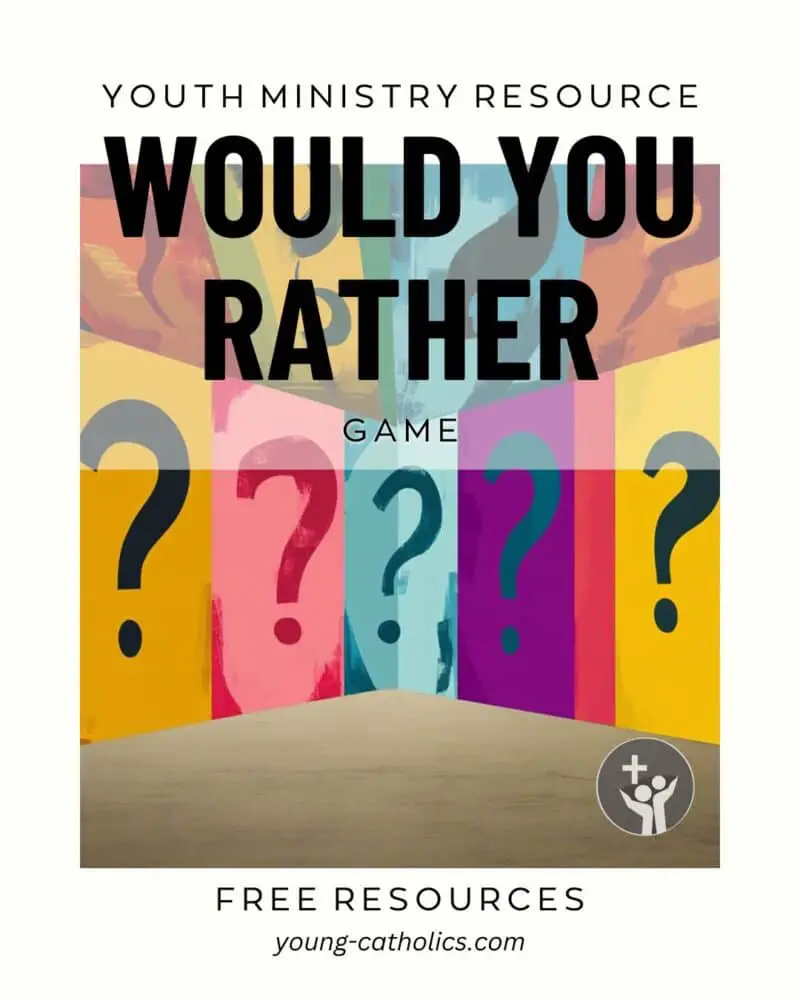
Would You Rather
Would You Rather is a simple game where players choose between two options and explain their choice. It helps youth learn more about each other and share their thoughts. The game encourages listening, creativity, and honest conversation. It’s easy to play with printed questions and works well in small or large groups.
This game fits youth ministry themes like choices, trust, and sacrifice. It can spark talks about making good decisions, trusting God, and thinking about others. You can connect it to Bible stories like David and Goliath or Daniel in the lion’s den. It’s a fun way to build friendship and grow in faith at the same time.
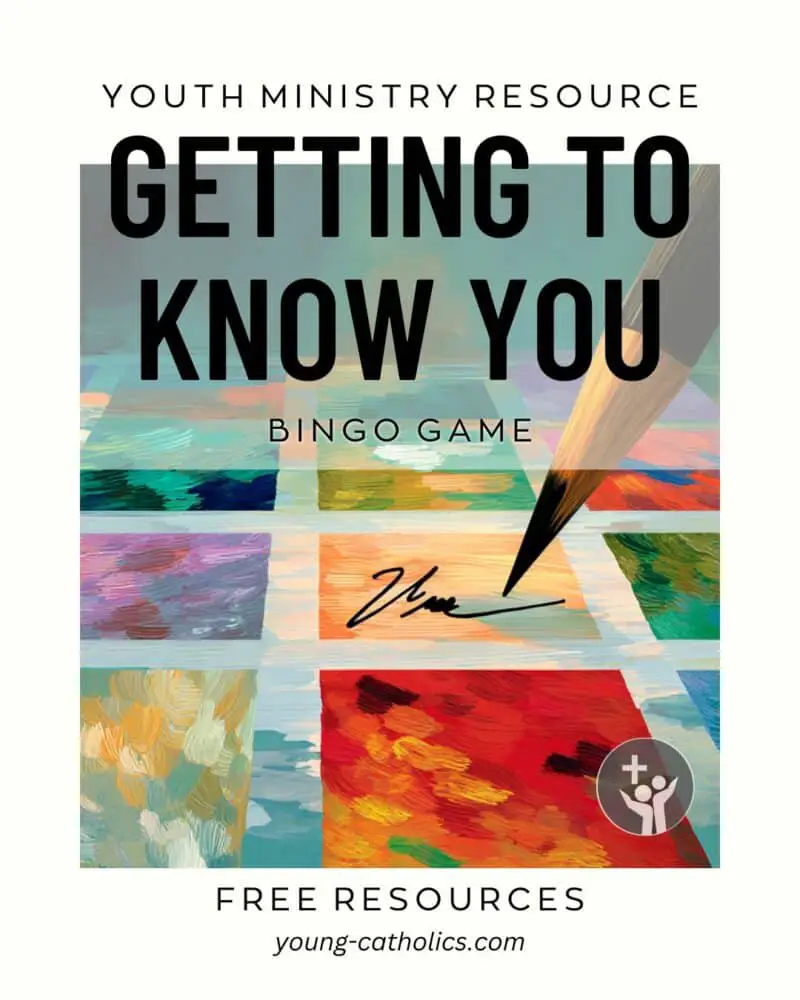
Getting to Know You Bingo
Getting to Know You Bingo is a fun icebreaker for middle school VBS or youth group. Each student gets a bingo card with different phrases like “has a pet” or “likes pizza.” They walk around and find people who match the phrases and get them to sign the squares. You can play until the whole card is filled or use a shorter version like filling one row or four corners.
This game helps students meet each other and feel more comfortable. It fits well with themes like fellowship, welcome, and building community. It’s a good way to start a new program, especially when kids don’t know each other. It also helps youth see what they have in common and learn to listen and connect.
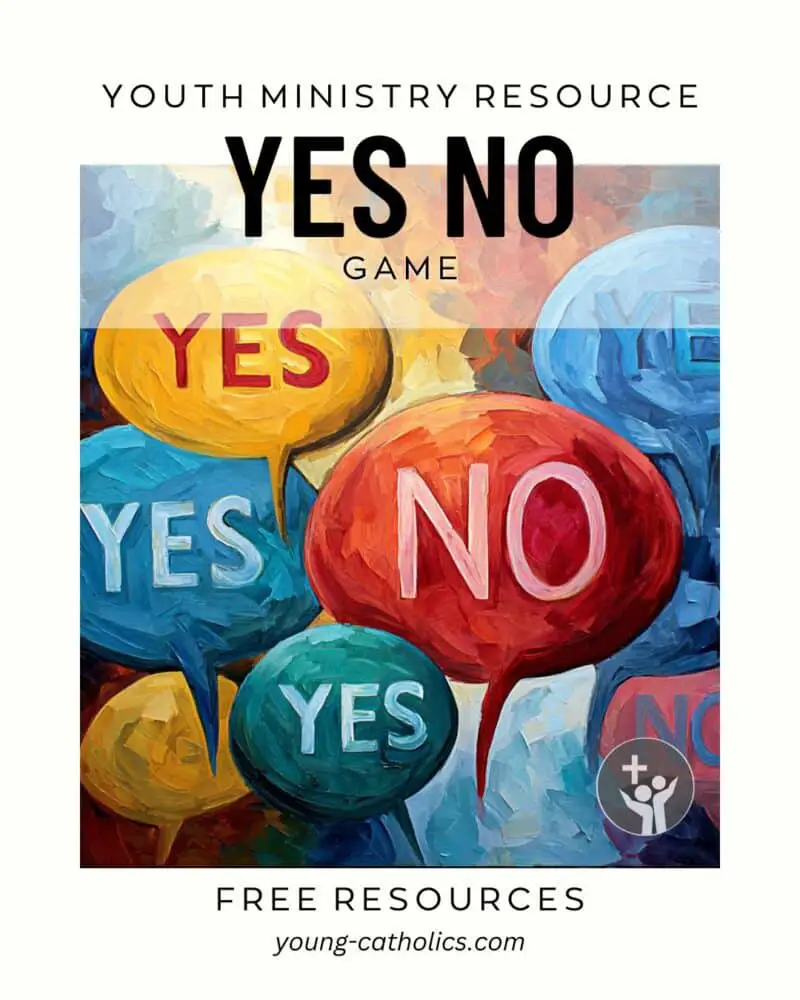
Yes No
The Yes No Game is a fun and engaging activity for youth groups. Players ask each other yes-or-no questions, but if they say “No,” they must give up their tokens. The goal is to keep as many tokens as possible. This game encourages quick thinking and creativity while keeping everyone involved.
This game can be used to teach about saying “Yes” to God. It connects well with themes like trust, obedience, and faith. It is a great way to talk about Mary’s “Fiat” at the Annunciation or the calling of the disciples. The game also helps youth reflect on how often they say “No” in life and how they can be more open to God’s plan.
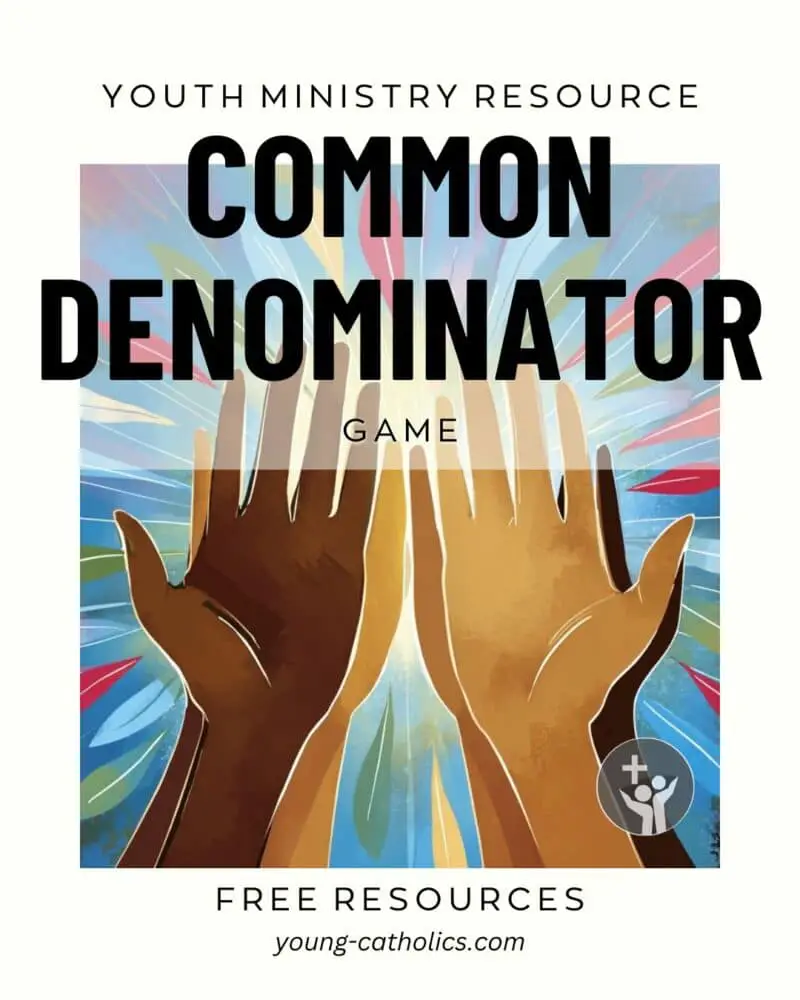
Common Denominator
Common Denominator is a fast-moving icebreaker that helps youth find what they have in common. The leader calls out a number, and players quickly form groups of that size. Each group has 15 seconds to discover one thing they all share, like “we all have a pet” or “we all like pizza.” Groups earn points if their answers are true, clear, and not repeated by others.
This game builds community and helps youth see their shared experiences. It fits well with themes like unity, friendship, and the dignity of each person. It encourages teamwork, listening, and respect. The game is simple, needs no supplies, and works in any space. It’s a great way to start a youth night or VBS session and helps break down barriers so real friendships can grow.
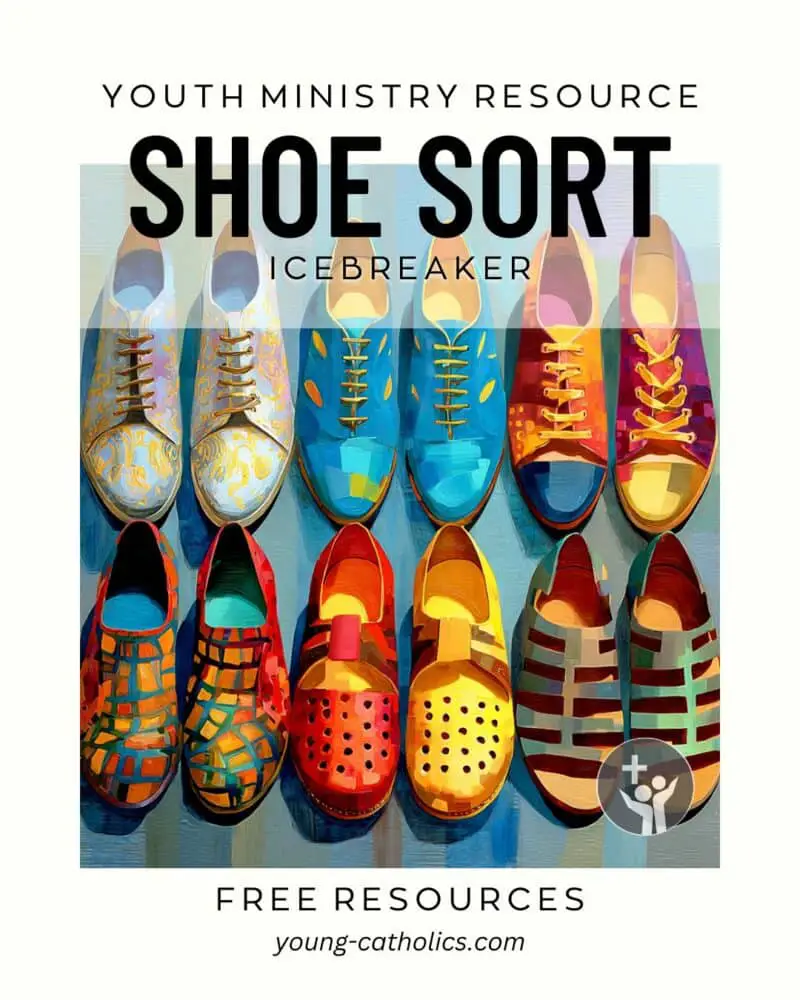
Shoe Sort Icebreaker
Shoe Sort is a fun icebreaker where everyone takes off their shoes and puts them in a pile. One person picks a pair, guesses who they belong to, and describes three traits they think fit the owner. If the guess is right, the person gets their shoes back. If not, the guessed person becomes the next guesser. The game continues until all shoes are returned.
This game helps youth reflect on how we judge others by how they look. It fits themes like dignity, empathy, and seeing others as God sees them. It opens the door to talk about bias and understanding others more deeply. It also builds trust and connection within the group.

Common Ground
The Common Ground game is a fun and easy way to help youth connect, relax, and build relationships. By stepping into the circle for things they share in common, participants see how their experiences, interests, and values overlap with others in the group. This game encourages a sense of inclusion and belonging.
The game can be used with many youth ministry themes, like dignity, gratitude, kindness, or service. It helps youth see the value in others and reflect on shared humanity. It also creates a positive, welcoming atmosphere, making it a great icebreaker for any gathering or lesson. It’s simple, requires no materials, and works with groups of all sizes.

Panic or Peace
Panic or Peace is a fast-paced game where teens react to silly or strange situations. They must quickly decide to panic or stay peaceful, then act it out. It helps break the ice, loosen up the group, and encourage quick thinking.
This game works well with youth ministry themes like trust, fear, and making choices. It can start conversations about how we react in tough or strange moments. It’s simple, fun, and full of laughter.
Team Building Games
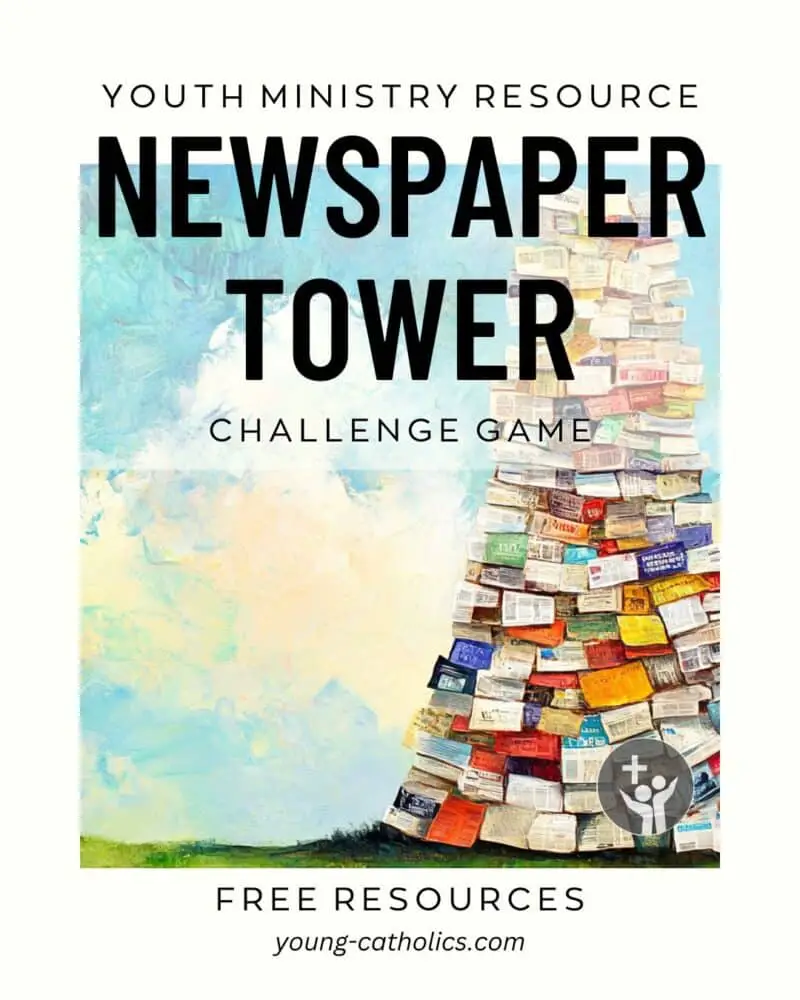
Newspaper Tower Challenge
The Newspaper Tower Challenge game is a fun activity where teams build the tallest freestanding tower using newspapers and tape. It encourages creativity, problem-solving, and perseverance.
This game can be tied to youth ministry themes like building a strong foundation in faith (Matthew 7:24-27) or humility, as seen in the Tower of Babel (Genesis 11:1-9). It’s easy to set up and works for any group size or age.
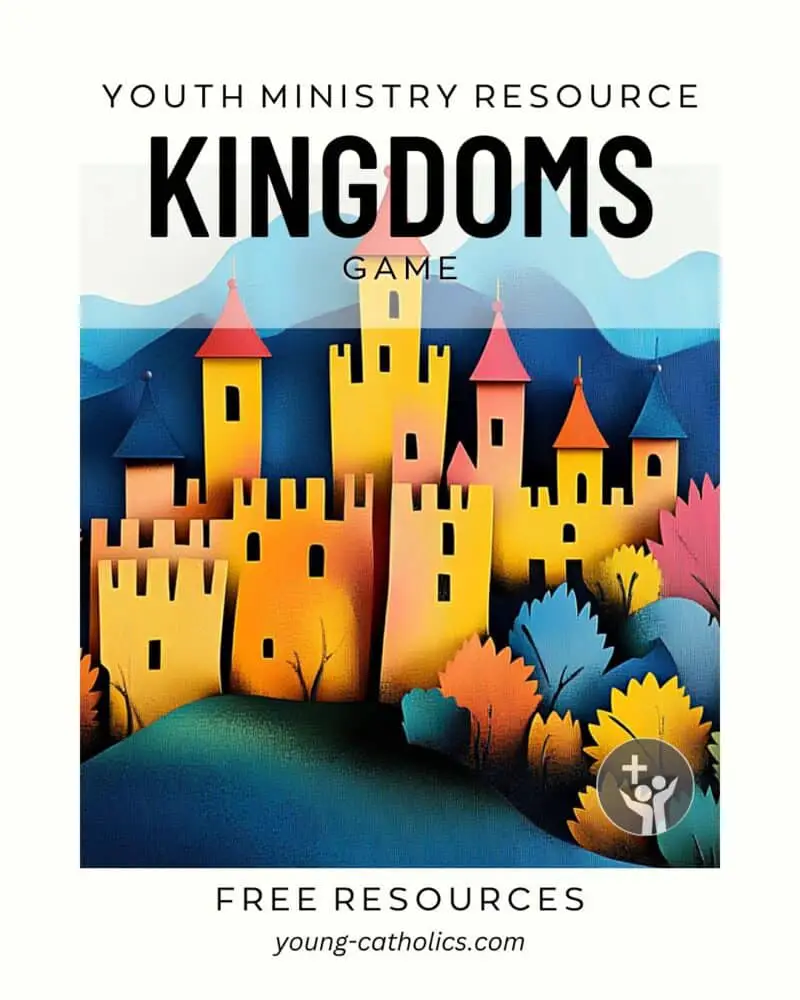
Kingdoms
Kingdoms is a fun group game that helps youth build memory, teamwork, and focus. Each player secretly picks a word in a chosen category. One by one, players guess words to find out who picked what. If a guess is right, the person guessed becomes a vassal and joins the guesser’s kingdom. The largest kingdom wins.
This game connects well to youth ministry themes like leadership, loyalty, and the Kingdom of God. It shows how strong leaders guide others and how small things can grow big—just like Jesus said about God’s kingdom. It also teaches the value of wise choices and working together in faith.
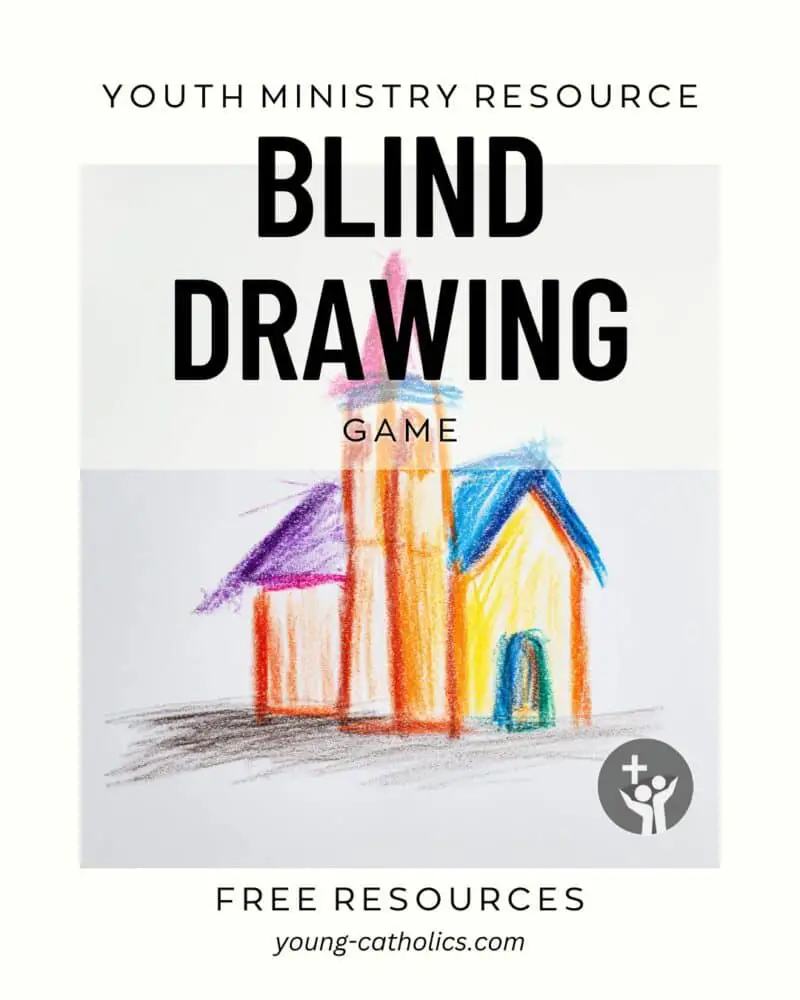
Blind Drawing
The Blind Drawing game helps youth practice listening and giving clear instructions. One person describes a picture using only shapes and colors. The other person draws based on what they hear. They cannot see the picture or use object names.
This game is great for youth ministry themes like trust, communication, and following God’s voice. It works well in small groups or large gatherings. It also makes a fun and meaningful way to start a lesson or reflection.
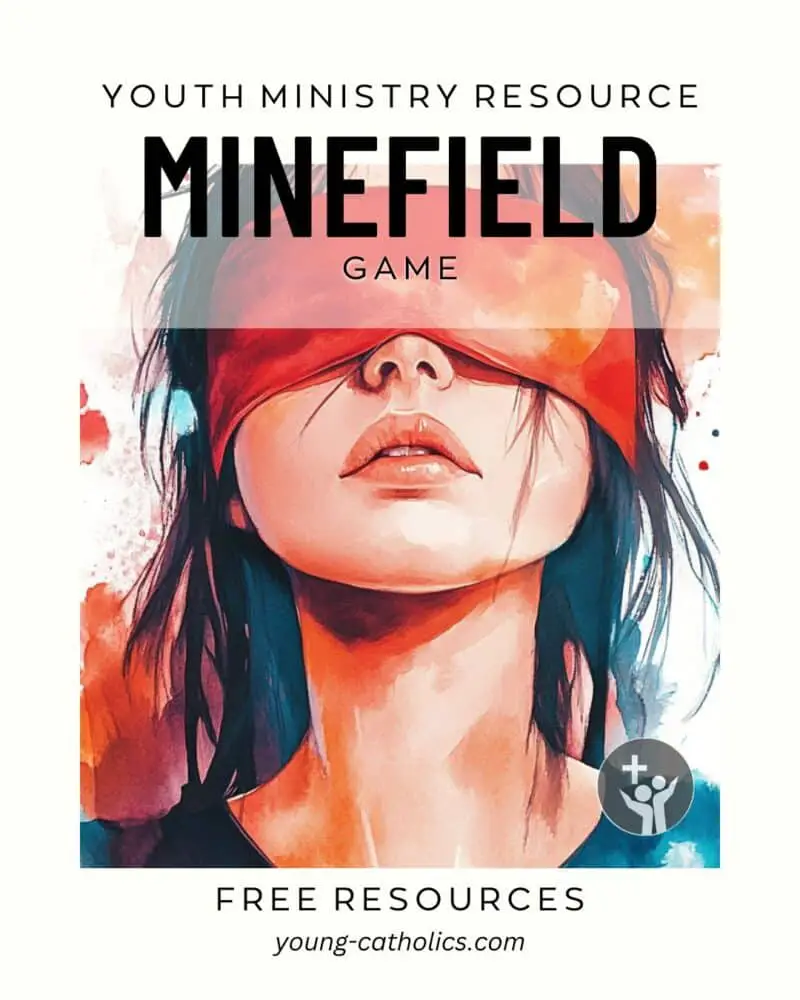
Minefield
Minefield is a teamwork game where one person is blindfolded and guided by a teammate through a path filled with obstacles. The caller gives clear directions while the blindfolded player listens and follows. If a player hits an obstacle, they must return to the start and try again. The first team to get all players across wins.
This game teaches trust, listening, and patience. It connects well with youth ministry themes like trusting God, listening to His voice, and not giving up when we face challenges. It shows that we need help from others—and from God—to move forward in life.
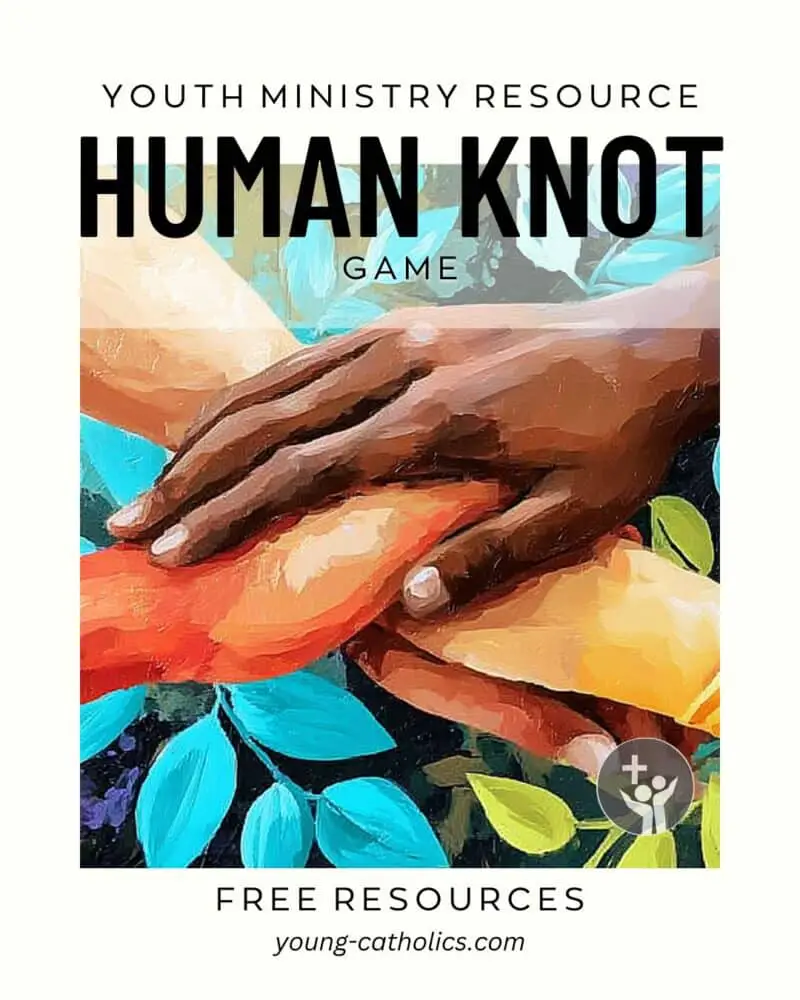
Human Knot
The Human Knot is a fun team-building game where players stand in a circle, grab hands with two different people, and work together to untangle themselves without letting go. It teaches communication, patience, and creative problem-solving. Everyone must listen, move carefully, and support each other to succeed.
This game fits youth ministry themes like unity, helping others, and perseverance. It also connects to Our Lady Untier of Knots, who helps us untangle life’s problems with faith and trust. Youth learn that working together, like the Body of Christ, makes hard things easier. The game becomes a way to grow in friendship and faith.
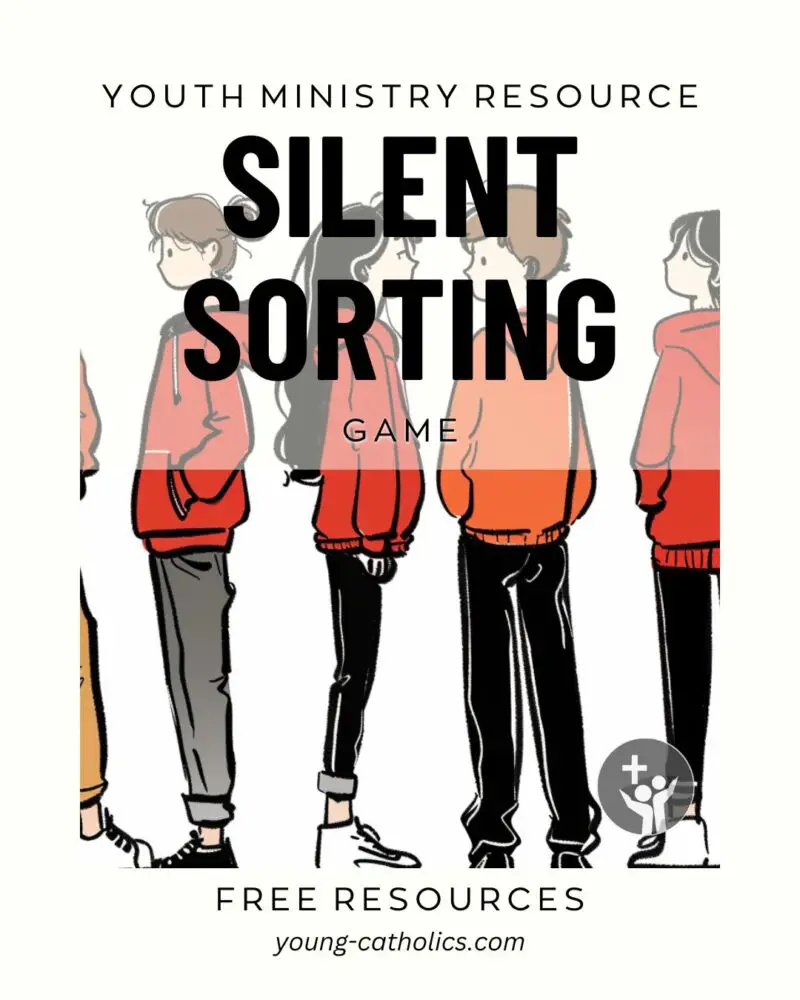
Silent Sorting
Silent Sorting is a team game where youth must line up in the correct order—by number, birthday, or other category—without speaking or using hand signals. They must find creative, non-verbal ways to communicate and solve the problem together. This builds teamwork, focus, and problem-solving skills.
The game fits well with youth ministry themes like unity, listening, and silence. It reminds youth of Bible verses like “Be still and know that I am God” (Psalm 46:10) and St. Paul’s teaching about the Body of Christ (1 Corinthians 12). It teaches patience, humility, and the importance of working as one.

Guide Me to Heaven
Guide Me to Heaven is a team game where blindfolded players are guided through an obstacle course by their leader’s voice. The goal is to reach “heaven,” marked by two chairs at the end. Only one player moves at a time while the rest wait their turn. The first team to get all members to the finish line wins.
This game teaches trust, teamwork, and the value of clear guidance. It connects to youth ministry themes like following God’s path, listening to His voice, and the role of the Church in helping us reach heaven. It shows that with strong faith and support, we can avoid obstacles and stay on the right path.
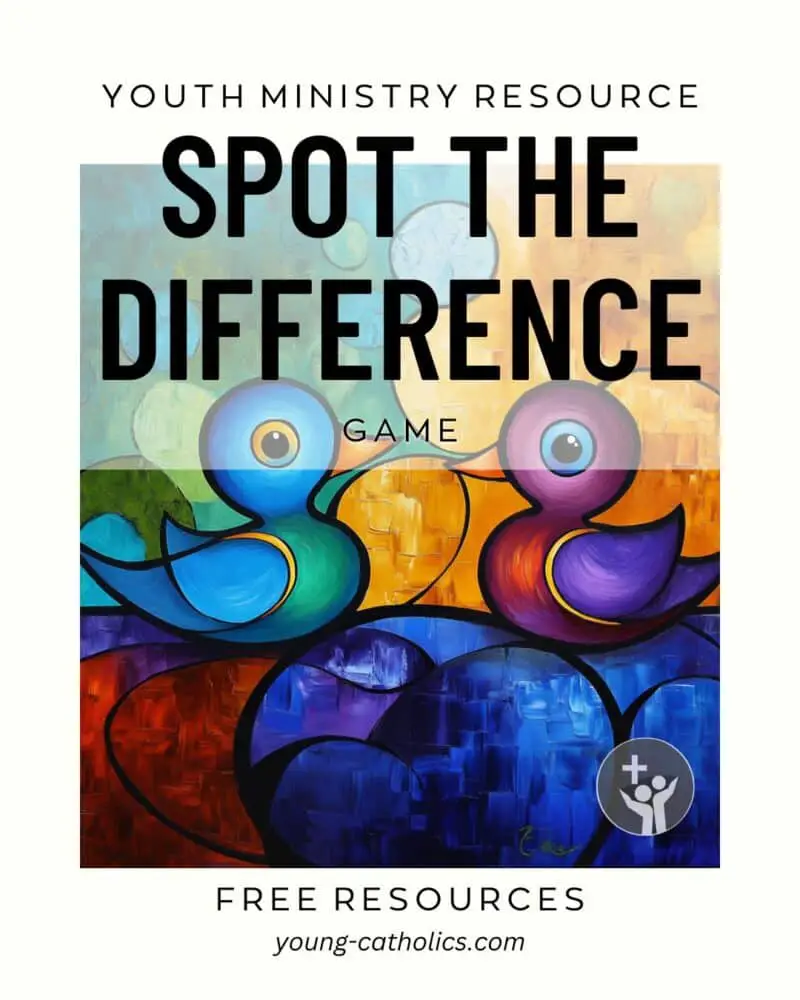
Spot the Difference
The Spot the Difference game helps youth practice observation and focus. One team changes small things about their appearance, and the other team tries to spot what is different. It encourages paying attention to details and noticing changes.
This game works well with themes like awareness, seeing God in everyday life, and recognizing change. It is simple to organize, requires no equipment, and works for groups of all sizes. Youth will enjoy the challenge while learning important lessons about being present and observant.
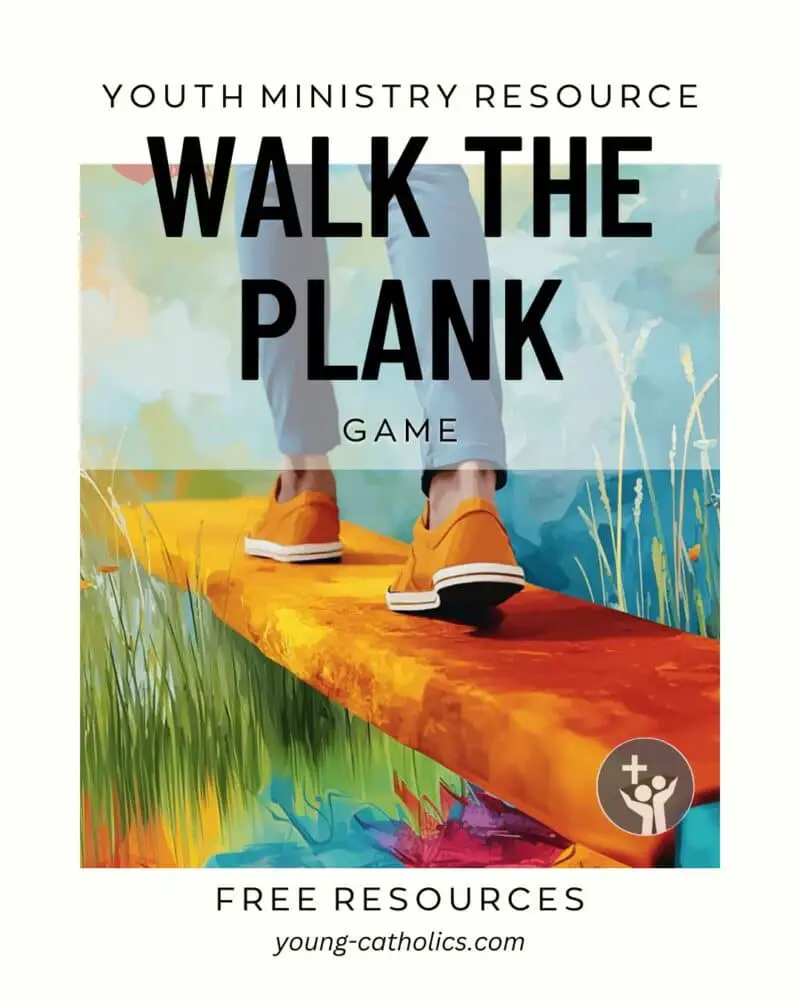
Walk the Plank
Walk the Plank is a teamwork game where small groups move across a space using only two wooden planks. Players must all stay on the boards and work together to move one plank forward, step onto it, and repeat the process. If anyone falls off, the team starts over. The game is fun, challenging, and great for middle school youth.
This game teaches communication, patience, and problem-solving. It fits youth ministry themes like unity, helping others, and perseverance. Just like in our faith journey, the goal is to stay on the right path and support each other along the way. It’s a great way to build trust and grow as a group.
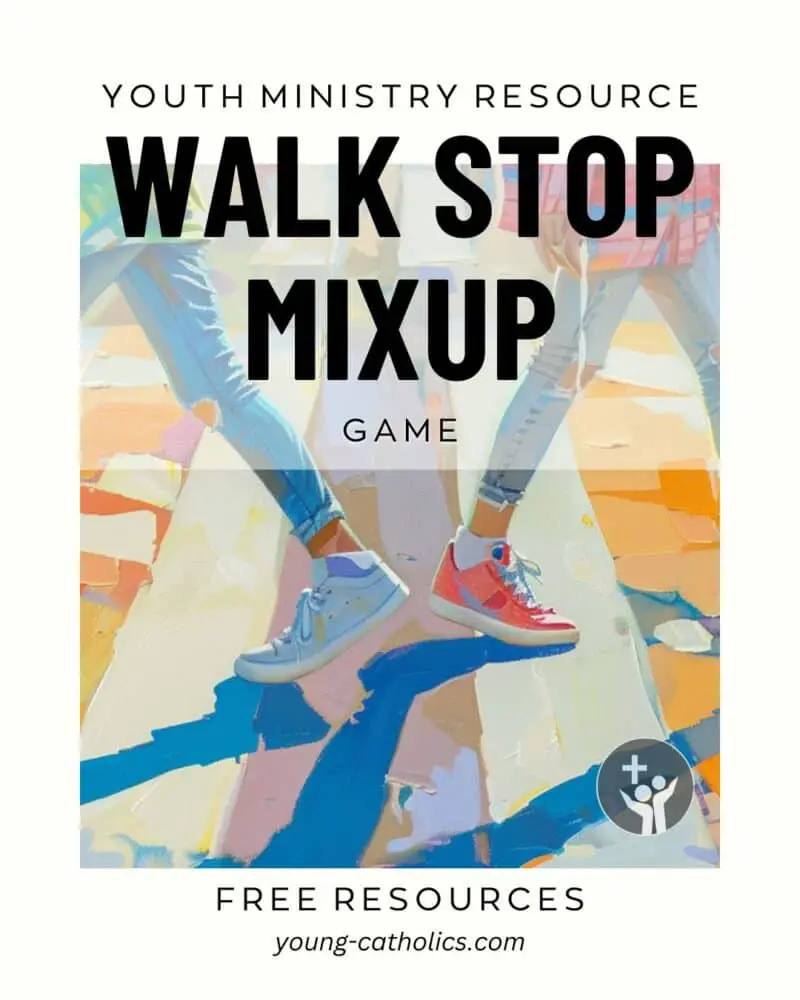
Walk Stop Mixup
Walk Stop Mixup is a fun and active game that helps youth practice listening and following directions. Players start by walking when told “walk” and stopping when told “stop.” Then the commands are switched—“walk” means stop, and “stop” means walk. More commands like “clap” or “tap” can be added to make it more challenging and fun.
This game teaches focus, patience, and humility. It connects to faith themes like listening to God, trusting His guidance, and growing as a community. It also reminds youth that it’s okay to make mistakes. Laughter and teamwork help them build strong bonds and enjoy learning together in a joyful way.
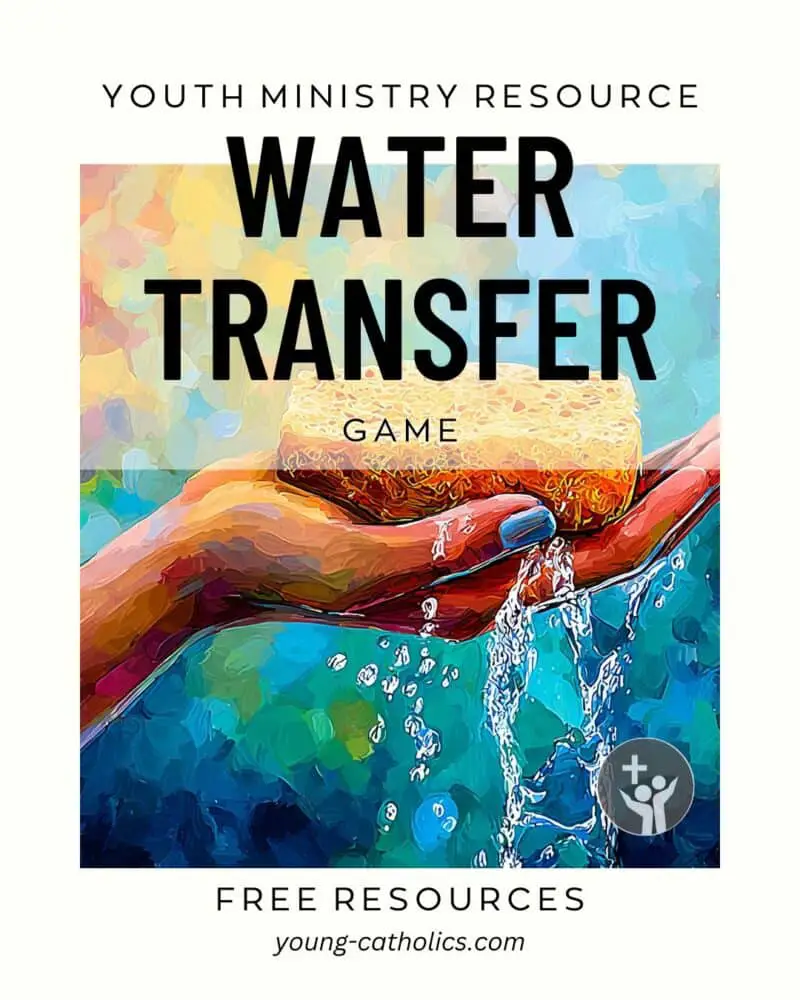
Water Transfer
Water Transfer is a fun and messy team game perfect for VBS or youth group. Teams must carry water from one end of the field to the other using creative tools like sponges, cups, or buckets with holes. They must stay connected while moving, or they have to go back. The first team to fill their bucket at the finish line wins.
This game builds teamwork, problem-solving, and patience. It fits well with youth ministry themes like unity, cooperation, and helping each other. It also shows how working together—even when it’s hard—can lead to success. It’s a great way to build friendships and have fun with a purpose.
Relays and Races
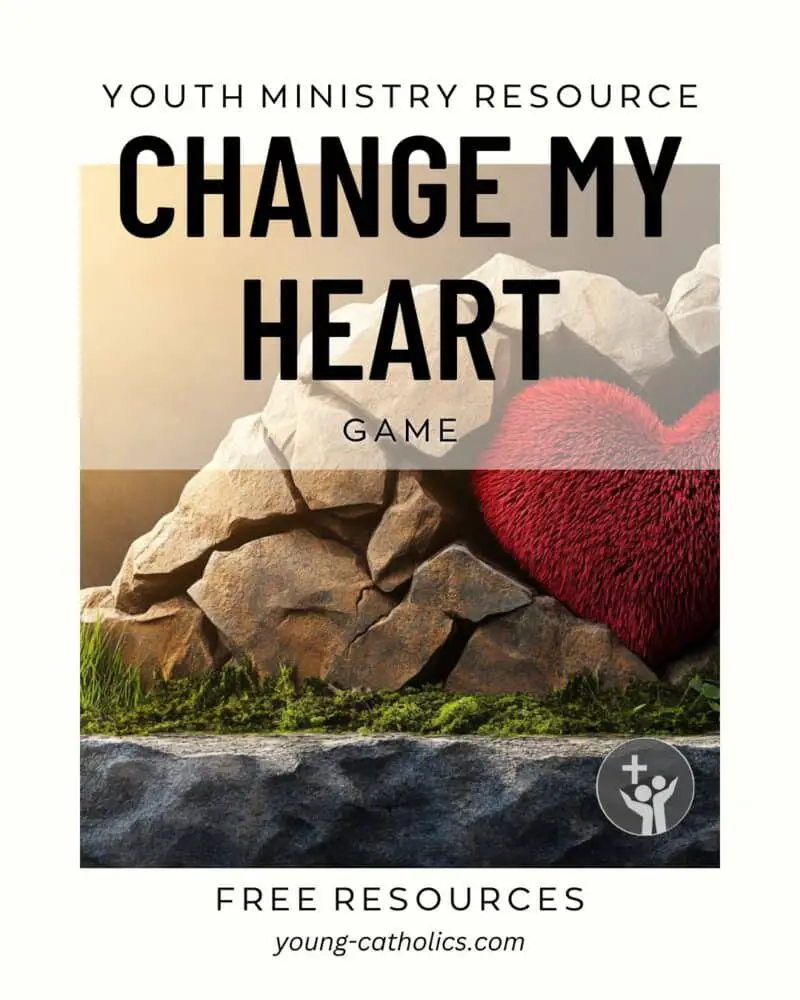
Change My Heart Relay Race Game
The Change My Heart relay race game is a fun and active way to teach about conversion. Players replace stones with candy hearts, showing how God takes away sin and fills hearts with love. This simple game helps youth understand that real change takes action.
This game works well with themes like conversion, repentance, and God’s mercy. It connects to Bible stories like St. Paul’s conversion and the Prodigal Son. It also relates to the sacrament of confession, where God removes sin and gives grace. This is a great game for youth ministry, retreats, or religious education classes.

Blanket Carry Relay
The Blanket Carry Relay game is a fun and active way to build trust, practice service, and reflect on faith. Teams take turns carrying a teammate on a blanket around a course, rotating roles until everyone has a turn.
This game can connect to youth ministry themes like helping others, as seen in the story of the paralyzed man in Mark 2:1-12, and carrying each other’s burdens, inspired by Galatians 6:2. It encourages youth to think about how they can support one another physically and spiritually.

Camel through the Eye of a Needle Race
Camel through the Eye of a Needle Race is a fun and meaningful game for youth ministry. Players act as “camels,” carrying balloons in saddlebags through an obstacle course. The goal is to make it through a narrow space—like the “eye of the needle”—without dropping the load. If the saddlebag falls or is touched, they must start over. Teams race to get all their balloons through the course.
This game teaches youth about letting go of things that weigh us down, like pride or material things. It connects to Jesus’ words about how hard it is for the rich to enter the Kingdom of God. The game also shows the value of humility, simplicity, and trust in God. It helps youth reflect on what they may need to give up to follow Jesus more closely.

Pig Food Race
The Pig Food Race is a fun and silly game that helps youth connect with the story of the Prodigal Son. Players push a soft ball using only their noses, crawling like pigs across the floor. This reminds them of the son’s lowest moment—longing to eat pig food. It’s a hands-on way to explore the results of poor choices and how sin can lead us to hard places.
The game also teaches lessons about humility, repentance, and God’s mercy. Just as the Prodigal Son had to humble himself and return home, players must get low to finish the race. It opens the door for reflection on how God always welcomes us back with love. This activity makes a serious Bible lesson easier to understand while bringing energy and laughter to your youth group.

Phony Fun
Phony Fun Relay is a silly relay race where players dress up in masks, hats, wigs, and other funny props. Each team member runs to the pile of props, puts on at least four items, and runs back. If anything falls off, they must return and try again. The race continues until all team members have taken a turn.
This game is perfect for lessons about pretending to be someone we’re not. It connects to youth ministry themes like honesty, hiding from God, and being true to ourselves. It reminds youth that God sees the real us and loves us anyway. It’s a fun way to start a deeper conversation.

Crossed Up Jam Up
Crossed Up Jam Up is a fast-paced relay game where four teams move across the room from corner to corner using silly movements like crab walking, hopping, or walking with eyes closed. Everyone moves at the same time, causing a “traffic jam” in the middle. The first team to get all players to the opposite corner wins a point. The game continues with new movement styles each round.
This game teaches teamwork, patience, and problem-solving. It fits youth ministry themes like dealing with obstacles, working together, and staying focused on your goal. It can also start a discussion about how life can feel crowded or confusing, but God helps us find the way.

Unlock Your Future
Unlock Your Future is a team game where youth search for hidden number cards and a matching lock. Each team has its own color and must find the numbers for their lock, figure out the correct order, and unlock it. The first team to open their lock wins. You can make it a scavenger hunt by adding clues and more locks in a sequence.
This game teaches teamwork, patience, and problem-solving. It connects to youth ministry themes like trusting in God’s timing, working through challenges, and discovering God’s plan. Just like the game, we don’t always know the right path right away, but with faith and effort, the way becomes clear.
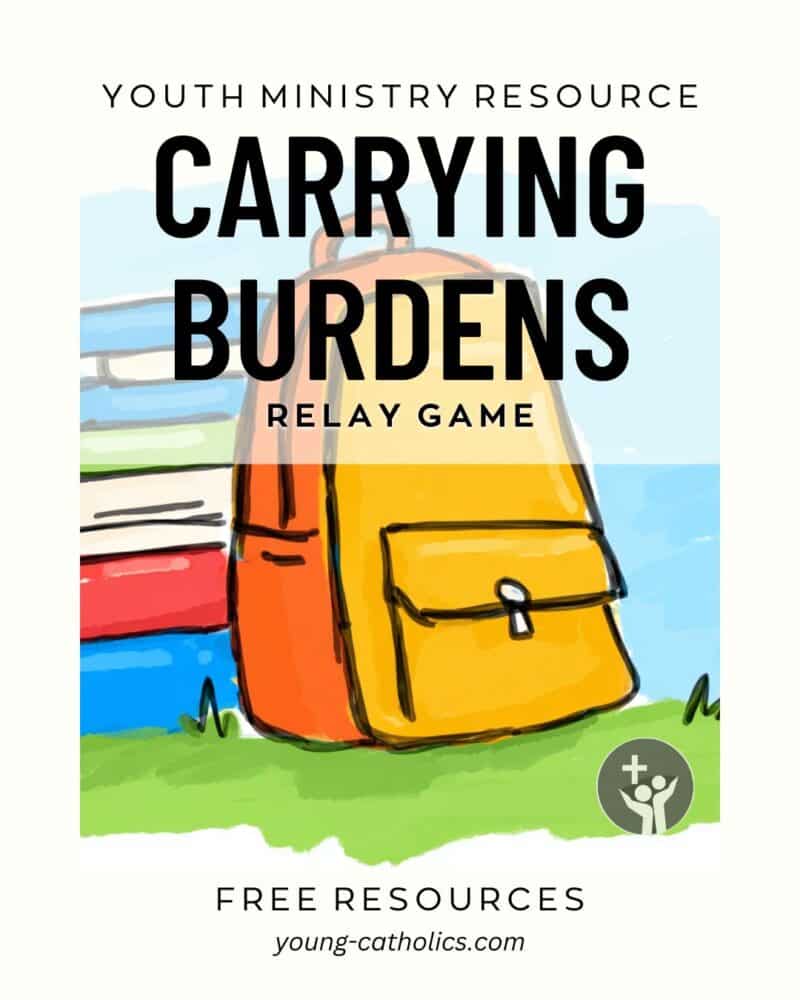
Carrying Burdens Relay Race
Carrying Burdens Relay Race is a team game where youth take turns running with a heavy backpack. Each time they reach a marked spot, they add an item to the bag before carrying it back and passing it to the next teammate. The race continues until all players have taken a turn.
This game teaches teamwork, endurance, and faith. The heavy backpack represents life’s burdens, reminding youth that everyone carries something hard. It opens the door to talk about how Jesus helps carry our struggles. It also shows the importance of supporting each other and trusting God when life feels heavy.

Pirate Peg Legged Race
Pirate Peg Legged Race is a fun relay game where pairs of players race with their legs tied together, like a three-legged race. Dressed in pirate gear, they run to collect treasure and bring it back to their team’s chest. Teams take turns until one chest is full. You can also play a water version, using hats to carry water instead of treasure.
This game builds teamwork, patience, and laughter. It fits youth ministry themes like working together, helping others, and finding joy in simple things. It can also remind youth that treasure isn’t always gold—true treasure is love, friendship, and faith in Jesus.

I Gotta Go
I Gotta Go is a funny relay game where youth race to drop a ping pong ball into a jar—while holding the ball between their knees. If the ball drops early, they must go back and try again. The first team to get all their balls into the jar wins.
This game brings lots of laughs and builds teamwork. It fits well with youth ministry themes like joy, patience, and working together. It can be used with lessons about waiting, Advent, or even pro-life topics. It’s a simple way to help youth relax, bond, and grow in friendship and faith.

Silly Server
Silly Server is a fun relay game where players act like waiters, balancing a ping pong ball on a plate while racing to a turnaround point and back. If the ball falls, they must start over. The game continues until all team members have had a turn. It’s light-hearted but requires focus, balance, and patience.
This game teaches teamwork, service, and trying again after failure. It connects to youth ministry themes like humility, helping others, and following Jesus’ example. Just like Jesus served others with care, youth learn that service takes effort and love. It’s a playful way to talk about serious faith lessons.

Pass It On
Pass It On is a fun relay game where teams pass a roll of toilet paper down the line using an over-under pattern. Players wrap the roll around their waist, then pass it to the next person. If the roll breaks, they stop, wrap it again, and continue. The game ends after a set number of rounds or when the roll is empty.
This game teaches teamwork, patience, and the idea of passing on faith and good deeds. It fits well with youth ministry themes like sharing God’s love, helping others, and building community. It’s simple, flexible, and brings lots of laughter while teaching a deeper message.

Water Balloon Relay
Water Balloon Relay is a fun, active game where teams use towels to toss and catch water balloons down a line. If the balloon drops or bursts, the team starts over. The first team to pass the balloon successfully to the end wins. It’s great for summer VBS, church camps, or youth group fun.
This game builds teamwork, trust, and communication. It fits with youth ministry themes like working together, supporting others, and celebrating joy in community. It’s a simple way to bring energy and laughter while reminding youth that faith and fun can go hand in hand.

Invitation Relay
Invitation Relay is a team game where players run to a box, pick an envelope, and complete the task inside. Tasks can be simple, like naming fruits or hopping on one foot. After finishing the task, they run back and tag the next teammate. The first team to finish wins, or the team with the most completed tasks wins if using a timer.
This game teaches youth about receiving and responding to God’s call. It connects with themes like saying yes to Jesus, making choices, and taking action in faith. Each small task is a reminder that God invites us every day to follow Him in simple ways. It also shows how each person plays a role in the Church and in their team.
Food Games

Not So Happy Meal
In the “Blended Happy Meal Challenge,” volunteers race to consume a Happy Meal. Unbeknownst to participants, the Happy Meals are blended into smoothies and served in clear cups. The setup involves hiding the blender and cups, while displaying the Happy Meals visibly. Participants, initially thinking they will eat a regular Happy Meal, are instead given the blended version to drink as quickly as possible.
The game, known for eliciting strong reactions and laughter, concludes with a prize for the fastest to finish their unconventional Happy Meal smoothie.

Baby Food Taste Tester
The Baby Food Taste Tester game is a fun and surprising activity where blindfolded players try different baby food flavors and guess what they are. Each correct guess earns a point. The game brings lots of laughter and can be made harder by adding food coloring or using blindfolds to remove visual clues.
This game works well in youth ministry to talk about spiritual nourishment. Just like babies need food to grow, we need God’s Word and faith to grow too. It reminds youth that the journey of faith can be unexpected, but every experience helps us grow. It’s a playful way to spark deeper reflection.

Jelly Donut Feeding
Jelly Donut Feeding is a messy and funny game where one blindfolded player feeds jelly donuts to their blindfolded partner using only one hand. The person being fed can’t use their hands at all. The first pair to finish all three donuts wins, or you can set a time limit and see who eats the most.
This game adds lots of laughter and is great for building friendship and trust. It works well in youth ministry to highlight themes like helping others, patience, and not taking ourselves too seriously. It’s a fun way to bring people together and remind us that joy and service often go hand in hand.

Toasted Game
In this variation of hot potato, participants play with toast and a variety of condiments, ranging from typical spreads like butter and jam to unconventional ones like ketchup and mustard. As bread toasts, players take turns adding a condiment. When the toast pops up, the person next in line must take a bite of the condiment-laden bread.
This game, suitable for large groups and often played upfront with 6-10 participants, incites laughter and anticipation as players cheer and challenge each other with creative, often gross, condiment combinations. It’s a fun, engaging activity that encourages participation and lighthearted competition.

Candy Identity
Candy Identity is a guessing game where players try to identify candy flavors by appearance only. They write down what they think each candy tastes like without smelling or tasting it. After guessing, they taste the candy and see if they were right. This can be played by the whole group or with a few players up front.
This game works well with youth ministry themes like identity, judging by appearances, and how we see others. It shows that what’s on the outside doesn’t always match what’s inside. It’s a simple and fun way to start deeper conversations about who we are in Christ and how we are all more alike than we think.

Donut Fishing
The Donut Fishing game is a humorous and slightly messy indoor activity perfect for youth ministry settings. Participants attempt to eat powdered sugar donuts dangled from strings attached to dowels, without using their hands.
This game, which can be played by everyone or in an upfront style with select teams, aligns well with themes of being spiritually fed, community, and even the concept of being ‘fishers of men’. It’s suitable for various meeting contexts, including discussions about community and shared meals like donuts after Mass. The game also offers a challenge version for added excitement, and it’s guaranteed to incite laughter and enjoyment among teens.
Active Games
- Glow in the Dark Dodgeball
- Protect the President
- Glow in the Dark Balloons Stomp
- Guard the Treasure
- Crown the King
- Penny Chin
- Not in My Basket!
- Train Tag
- Sheep and Goats
- Fruit Salad
- Cups and Downs
- Sleeping Conductor
- Tiger Tail Tag
- Shipwreck
- Fox and Chickens Tag
- Bail the Ship
- Planet Pickup Game
- Get on Noah’s Ark
- Musical Statues
- Caboose on the Loose
- Protection Dodge Ball
- Wild Wet Wiffle Ball
- Eternal Dodge Ball
- Mutiny (Human Pinata)

Glow in the Dark Dodgeball
Glow in the Dark Dodgeball is a fun and active game that gives a classic favorite a glowing twist. Players wear glow bracelets and throw soft, glow-taped dodgeballs in a darkened space marked with glow tape and cones. Standard dodgeball rules apply, with added excitement from the glowing setup.
This game is perfect for youth ministry events like lock-ins or retreats. It builds teamwork, energy, and connection. It also fits with themes like being a light in the darkness or shining with God’s love. It’s a great way to mix fun with faith and create lasting memories.

Protect the President
“Protect the President” is a dynamic dodgeball variant designed to energize groups. The game involves one or more dodgeballs and centers on a “president” who must avoid being hit, confined within a small taped circle for added difficulty. Players surround the president and a designated “bodyguard,” who defends the president from incoming balls.
The bodyguard can block with any body part, while the president dodges without touching the ball. If the president makes contact with the ball, roles switch: the thrower becomes the bodyguard, and the bodyguard becomes the president, ensuring a fast-paced and engaging activity.

Glow in the Dark Balloons Stomp
The Glow in the Dark Balloon Stomp game is a fun activity for youth groups. Players try to pop each other’s glowing balloons while protecting their own. It’s exciting, active, and easy to set up. The game can be used to teach themes like God’s light guiding us and staying strong in faith. It’s perfect for evening events or any time you want a creative way to build energy and share faith lessons.
This game brings fun and purpose together in a way that engages youth and encourages them to think about their relationship with God.

Guard the Treasure
“Guard the Treasure” is an engaging indoor game suitable for small youth groups of 6 to 8 players. One player, designated as “It,” guards an object representing the treasure, placed at their feet against a wall. The remaining players, the thieves, attempt to snatch the treasure without getting their hands touched by “It.” If “It” touches a thief’s hand, that hand is immobilized; if both hands are touched, the thief becomes a guard alongside “It.”
The game escalates as more players join the guard, and if a thief successfully claims the treasure, they become “It” for the next round, promoting alertness and strategy.
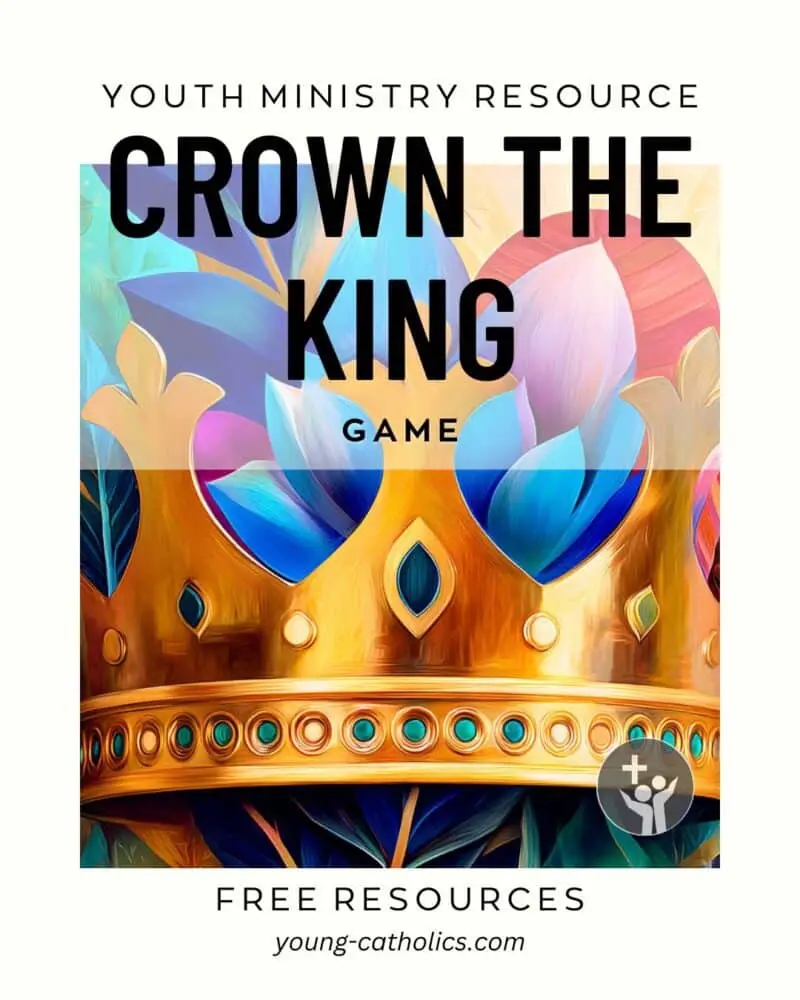
Crown the King
Crown the King is a fast-paced game where players wear paper crowns and try to knock off each other’s crowns using soft, half-length pool noodles. The goal is to keep your own crown on while gently tapping others’ off. Once your crown falls, you’re out. The last person with a crown wins.
This game is great for youth ministry because it teaches quick thinking, fair play, and respect. It can connect to themes like protecting your faith, staying strong under pressure, or defending what matters. It also builds community through fun and teamwork.
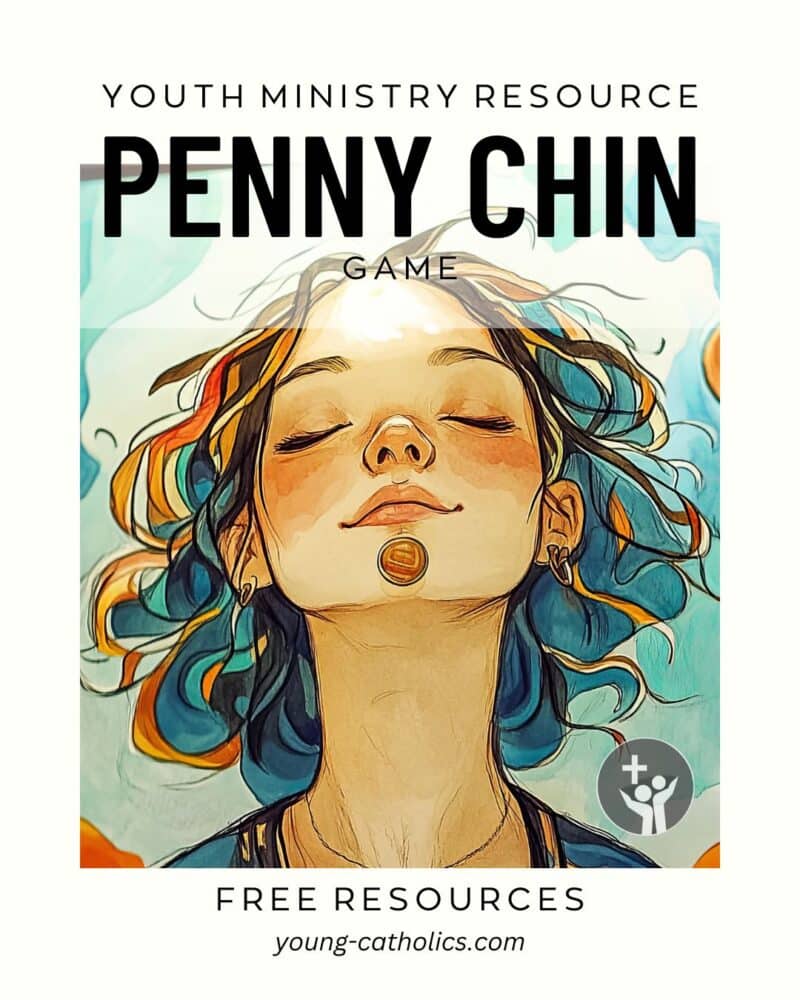
Penny Chin
Penny Chin is a humorous game where players balance a penny on their chins, trying not to use hands or tilt heads back. The amusing challenge, involving pairs attempting to distract each other to cause the penny to drop, serves as a delightful icebreaker or lesson tie-in on topics like money, tithing, or generosity.
A clever trick—using the lower lip to secure the penny—adds a twist, making it harder as smiling and laughing jeopardize the penny’s stability. The last person to keep the penny on their chin wins, ensuring laughter and engagement throughout the game.
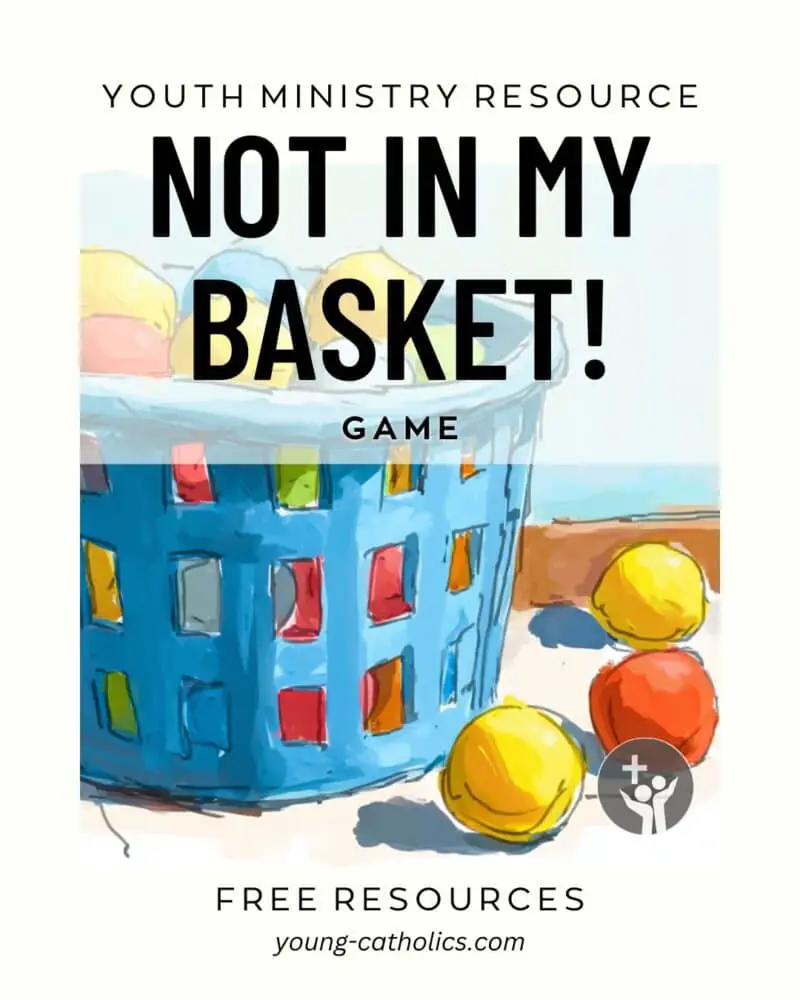
Not in My Basket!
The Not in My Basket game is a fun activity where teams collect their own colored balls while keeping others out of their basket. It teaches decision-making and fairness and can connect to youth ministry themes like focus, respect, and treating others with kindness.
The game is also a great way to spark discussions on racism, immigration, and helping others. It encourages players to reflect on how small actions impact others and how God calls us to welcome and support one another. This simple but meaningful game is perfect for youth ministry, retreats, or group gatherings.

Train Tag
Train Tag is a dynamic, no-supplies-needed game ideal for youth groups or Vacation Bible School, especially fitting a railroad theme. Starting with three “engines” who are “it,” the game involves tagging other players to add them as “cars” to their train by linking arms. Only engines can tag, and if a train breaks, it must be reformed before tagging resumes.
The game concludes when all players are part of a train, with the longest train declared the winner. This game promotes physical activity, teamwork, and strategy, making it a spontaneous and engaging choice for group settings.

Sheep and Goats
Sheep and Goats is a fun and active way to teach youth about making good choices. It is based on Matthew 25:31-46, where Jesus separates the sheep from the goats. This game helps young people understand the importance of helping others and choosing kindness. It works well as a warm-up before a lesson on the Final Judgment or the Corporal Works of Mercy.
Players must move balloons, representing sheep and goats, to the right side. This fast-paced game makes youth think about their actions. It also encourages them to reflect on how they can serve others in their daily lives. It is easy to set up and keeps youth engaged while reinforcing an important faith lesson.
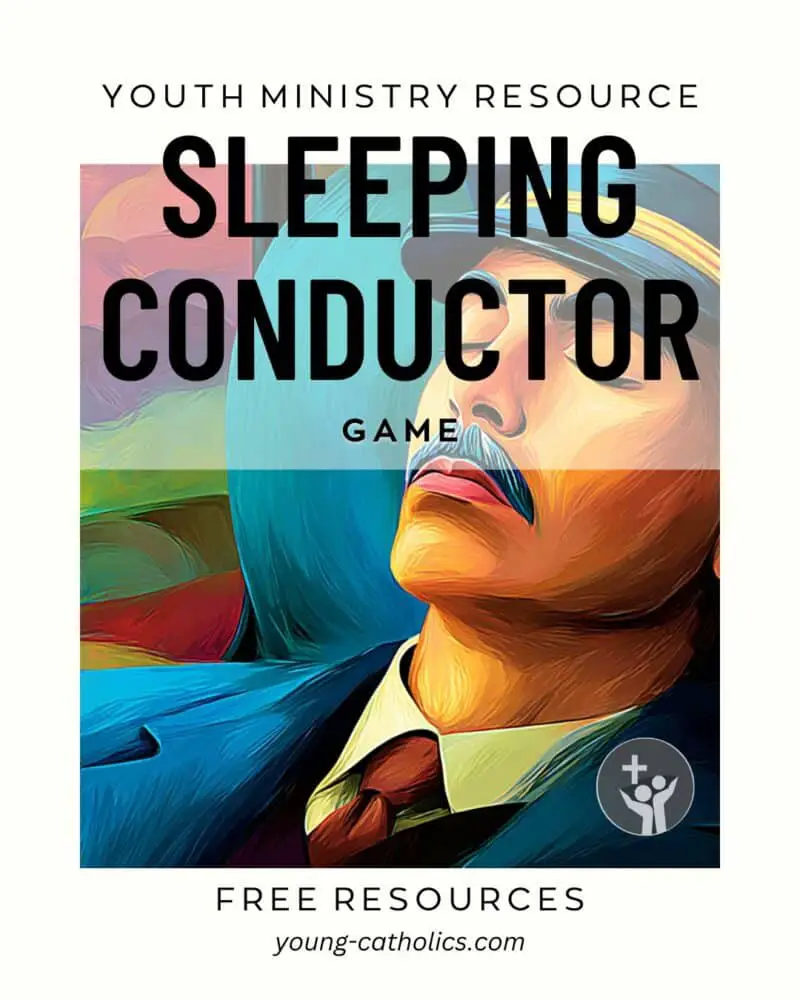
Sleeping Conductor
The Sleeping Conductor game is a fun guessing game for youth groups. One player pretends to sleep while another quietly steals a “ticket.” The sleeper then wakes up and tries to guess who took it. It helps build focus, thinking skills, and attention.
This game works well with youth ministry themes like staying alert in faith, making wise choices, and being honest. It can lead to short, meaningful talks about Scripture, like Jesus telling His followers to stay awake or King Solomon asking for wisdom.

Tiger Tail Tag
Tiger Tail Tag is a fun, high-energy game where players chase a “tiger” to pull off its tail. The tiger wears a flag or cloth as a tail, and when someone grabs it, the tiger throws candy as a reward. Then the tail is reattached, and the game continues until the candy runs out.
This game works well for youth ministry because it builds community, gets everyone moving, and brings lots of laughs. It can connect to themes like perseverance, joy in the journey, or even “chasing after God.” It’s simple, active, and sweet—literally.

Shipwreck
In the Shipwreck game, teams use a “ship” (like a tarp, hula hoop, or cardboard) suitable for their size, ensuring fairness. It involves setting start and finish lines, dividing players into teams of 5-10, and racing while maintaining contact with their ship. Commands like “shark” require players to quickly gather on their ship, promoting teamwork and quick thinking. The first team to the finish line, following multiple rounds of “shark” commands, earns extra points.
The team with the most points wins, emphasizing strategic teamwork, adaptability, and coordination in a fun, competitive setting.

Fox and Chickens Tag
Fox and Chickens Tag is both fun and meaningful, suitable for youth groups or other events like Vacation Bible School (VBS). It offers more than mere entertainment, connecting with Christian themes like divine love and social justice. Participants play roles of Fox, Mother Hen, and Chicks, enjoying engaging play while reflecting on deeper values.
Since it doesn’t need any special materials, it’s accessible and promotes inclusiveness. Whether aiming to highlight religious themes or just foster joy and camaraderie, Fox and Chickens Tag can be an excellent addition to youth ministry activities.

Bail the Ship
Bail the Ship is a water balloon game that helps youth work together while having fun. Teams use towels to launch balloons over a divider, trying to catch and return them. It builds teamwork, coordination, and quick thinking. The game works well outdoors and is a great way to stay active and cool.
This game can be used in youth ministry to teach about community, stewardship, and working for the common good. Like the early Church in Acts, everyone must do their part. It also opens discussion about caring for God’s creation and using what we have wisely. It’s a playful way to teach faith lessons.

Planet Pickup Game
Planet Pickup is a high-energy game where kids race to grab a ball (a “planet”) and run around a “sun” in the center. It’s a great fit for space-themed events like Stellar VBS. The game can be played just for fun or as a team competition. It encourages physical activity, focus, and quick thinking.
This game can also connect to youth ministry themes like God’s creation and order in the universe. Just as planets move in harmony around the sun, we are called to live in harmony with God at the center. It’s a fun way to talk about God’s design and how we all have a place in His creation.
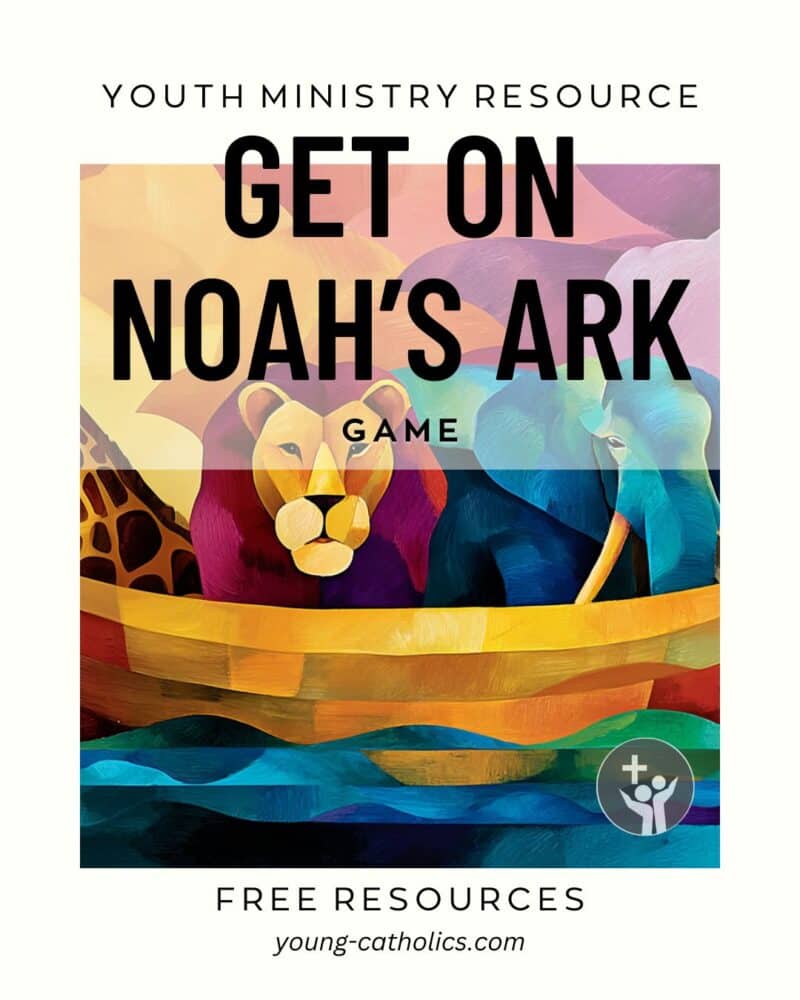
Get on Noah’s Ark
The Noah’s Ark game is a team-based activity that uses stuffed animals and laundry baskets. Players work in pairs to toss animals backward into the basket. It’s full of laughs and helps build teamwork and communication.
This game is great for youth ministry. It ties into themes like trust, obedience, and working together. It fits well with lessons on Noah, community, or God’s call. It’s easy to set up and fun for all ages.

Musical Statues
Musical Statues is an energetic game that encourages movement and fun, ideal for youth meetings or VBS, especially those focusing on themes like freedom or joy. Instead of chairs, players dance to music and must freeze when it stops; those who move afterwards are out.
This game, needing only a music source and speakers, is more inclusive and less physically risky than musical chairs, making it suitable for older youth. To engage shy participants, leaders can demonstrate exaggerated dance moves everyone must mimic, ensuring active participation and a lively atmosphere, while also providing a lively break between quieter activities.

Caboose on the Loose
In “Caboose on the Loose,” participants form small “trains” by holding onto the shoulders or hips of the person in front, with additional players acting as “cabooses” aiming to join a train. When a caboose attaches to a train, the lead player detaches to become a new caboose, keeping the game in constant motion.
This non-competitive, fun activity emphasizes teamwork and coordination, with an emphasis on safety to ensure all players can keep up without risk. It’s an excellent choice for energizing a group and fostering a sense of unity and laughter, perfect for youth groups or team-building sessions.
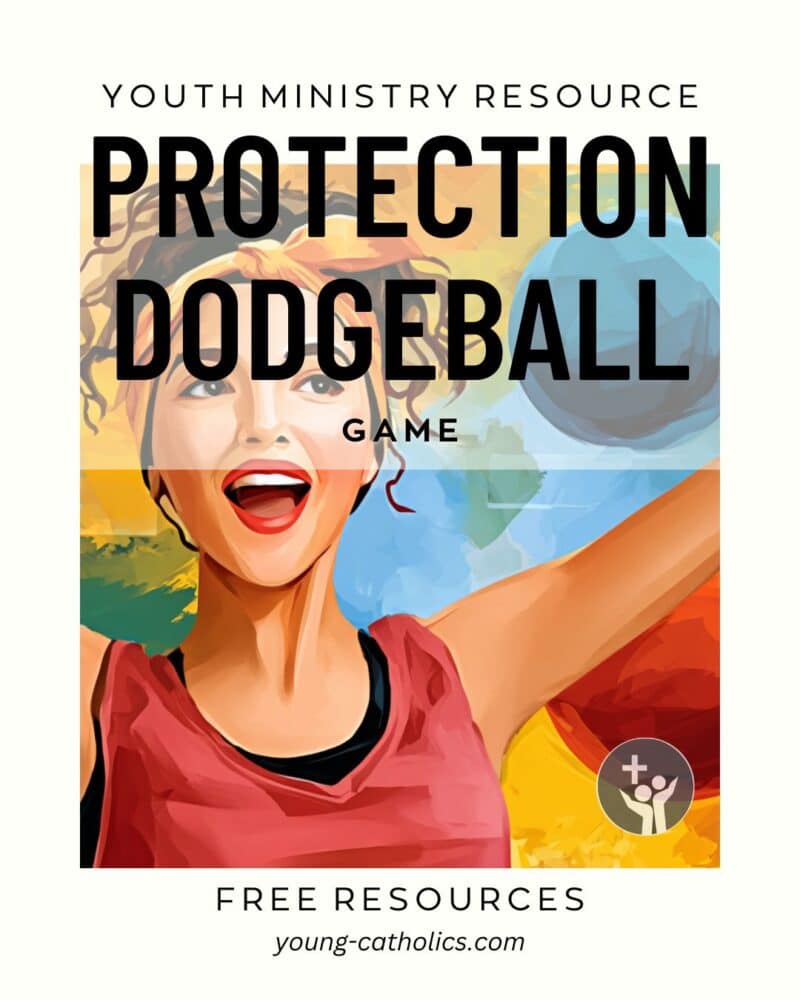
Protection Dodge Ball
Protection Dodgeball is a fun and active game where one player protects their partner from getting hit by soft balls. It builds teamwork, trust, and quick thinking. Players learn to care for each other and work together, making it a great icebreaker or youth group activity. The game is exciting and helps players feel supported and valued by others.
This game can be used to talk about how God protects us and how we can support each other in faith. It connects to Bible themes like intercessory prayer, the role of angels, and Jesus’ sacrifice. Just like the protector shields their partner, God watches over us. The game helps youth see faith in action and understand how we are called to care for others in daily life.

Wild Wet Wiffle Ball
Wild Wet Wiffle Ball is a refreshing twist on traditional wiffle ball, designed for youth group or VBS summer activities, incorporating water elements for extra fun. The game uses standard wiffle ball equipment, with kiddie pools as bases and options for sprinklers, Slip ‘n Slides, or splash pads to enhance the wetness.
The rules adapt to children’s capabilities, with modifications for batting and fielding to suit different age groups. Scoring and innings mirror regular wiffle ball, but with a splashy twist—players stand in water-filled pools for bases, adding a cool relief on hot days and making the game an enjoyable, wet adventure.
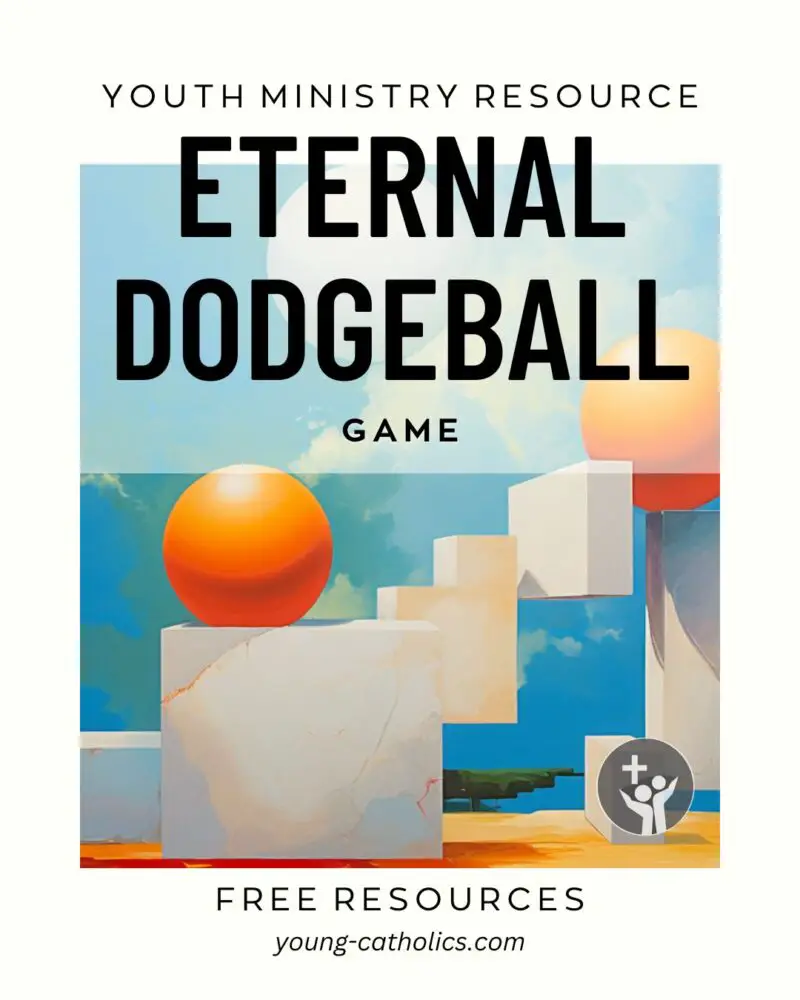
Eternal Dodge Ball
Eternal Dodge Ball is a silly, fast-paced game where no one stays out for long. When a player gets hit, they sit down, but they can return once the person who hit them is also hit. This keeps the game going and adds strategy. The game uses soft dodge balls and limits players to three steps when throwing, keeping things safe and fun. There are no teams, and the game can go on for a long time.
This game fits well with youth ministry themes like forgiveness, second chances, and eternal life. It can start a conversation about how God gives us many chances to return to Him and how His love never ends. Just like in the game, we may fall, but we’re always invited to get back up. It’s a great icebreaker and a creative way to connect fun with deep spiritual lessons.

Mutiny (Human Pinata)
Mutiny, also known as the Human Pinata game, is a fun and energetic game for youth groups or Vacation Bible School. One player is the captain, and the rest are pirates with foam noodles as swords. When pirates tag the captain, he must toss candy in the air. The pirates collect the candy while the captain runs away. The game ends when all the candy is gone.
This game encourages teamwork, fair play, and laughter. It can tie into themes like generosity and joy. Just as the captain shares candy, we are called to share our blessings with others. The game also shows how joy can come from giving and receiving. It’s a playful way to build community and remind youth that fun and faith can go hand in hand.
Knowledge and Teaching Games
- Love Definitions
- Noisy Circle
- Know It All
- Sacrament Scavenger Hunt
- Is the Price Right?
- Alphabet Race – A Humility Game
- Paper Toss and the Holy Spirit
- Leaders We Love
- Fearful Finds Relay
- Tangled Web
- Spread the Good News
- Create a Jeopardy Game Board
- Seeing the Big Picture
- Graceful Strides Relay
- Ten Commandments Dice Game
- Pathway to Change
- Survival Skills Game
- Saint Memory Match Game
- Bible Scavenger Hunt
- Whose Voice Is It?
- Strength in Numbers
- Toilet Paper Lazarus

Love Definitions
The Love Definitions icebreaker game is designed for youth ministry settings to explore diverse viewpoints on love and foster group unity and teamwork. In this game, participants form small groups to create a concise definition of love using five words or fewer.
These definitions are then shared anonymously, and the group guesses which team devised each one, leading to a discussion that allows individuals to share personal interpretations and experiences related to love. This activity not only prompts reflection on the meaning of love but also encourages creativity, collaboration, and open dialogue among participants.

Noisy Circle
Noisy Circle is a fun listening game that teaches youth how to focus in a loud setting. Players form a large circle and talk to a partner across from them while everyone else is talking too. It helps them practice listening carefully even with distractions around them. This skill is useful in everyday life and helps improve communication.
The game also connects to faith. It shows how hard it can be to hear God’s voice in a noisy world. Just like Elijah heard God in a quiet whisper, youth learn that they need silence and focus to hear God clearly. It’s a simple way to teach about prayer, attention, and spiritual listening in a fun and active setting.

Know It All
The Know It All Game is a competitive activity designed to test the knowledge of youth across various categories. Teams compete by writing down as many items as possible within a category in one minute, with the opportunity to rotate players if someone gets stuck.
Points are awarded for each unique, appropriate answer, and after several rounds, the team with the most points is declared the “Know It All.” This game not only encourages quick thinking and teamwork but also serves as an engaging way to review or introduce topics, from biblical figures to general trivia like state capitals or ice cream flavors.

Sacrament Scavenger Hunt
The Sacrament Scavenger Hunt is an engaging activity designed to familiarize participants with the symbols and concepts of the Catholic sacraments through interactive exploration. Items related to various sacraments are hidden around a meeting space or grounds for participants to find.
These range from direct sacramental symbols, like a cup of water for Baptism or a chalice for Eucharist, to more discussion-provoking objects like an eraser for Reconciliation or super glue for Matrimony. This scavenger hunt offers a dynamic way to spark conversations about the sacraments, making learning about faith both fun and memorable.

Is the Price Right?
“Is the Price Right?” is a fun game that teaches youth about money and real value. Players guess the prices of everyday items, then compare them with things that can’t be bought—like friendship, clean air, or faith. The game helps youth think about what really matters in life and how some things are worth more than money.
This game also connects to themes from the Bible. It shows that treasures in heaven are more important than material things on earth (Matthew 6:19-21). It can start good conversations about generosity, dignity, and what we truly value. Youth learn to look at the world differently and reflect on how they use their time, money, and energy.

Alphabet Race – A Humility Game
The Alphabet Race is a humility game designed to challenge participants’ confidence in their knowledge of the alphabet by asking them to arrange letters in reverse order. Selected from those who express confidence in their skills, players are given a bowl of alphabet letters to sequence backwards, with the twist of starting over if they misplace a letter.
This activity not only tests alphabetical knowledge but also prompts reflection on overestimating abilities and recognizing that tasks easy for some may be challenging for others. It serves as an engaging lead-in to discussions about humility, encouraging players to consider their own strengths and limitations.

Paper Toss and the Holy Spirit
The Paper Toss Holy Spirit game is a simple activity that teaches about how the Holy Spirit moves in our lives. Youth toss crumpled paper toward a basket while a fan blows, making it harder to aim. This shows how we can feel the wind but not see it, just like we experience the Holy Spirit even if we can’t see it.
This game can be used in Catholic youth ministry to support themes like Pentecost, confirmation, and growing in faith. It works well in Vacation Bible School or a faith formation class. The game is fun and helps youth reflect on the unseen power of God.

Leaders We Love
“Leaders We Love” is a small group activity that helps youth identify the traits they admire in leaders. Each group lists people they see as good leaders and writes down three qualities for each one. The groups then share their posters and discuss which traits came up most. This opens a conversation about what makes someone a strong and trusted leader.
The activity connects well with youth ministry themes like service, humility, and influence. It helps teens reflect on how leaders shape their lives and how they can grow as leaders themselves. It also encourages them to see leadership from different points of view, including traits they may not expect.
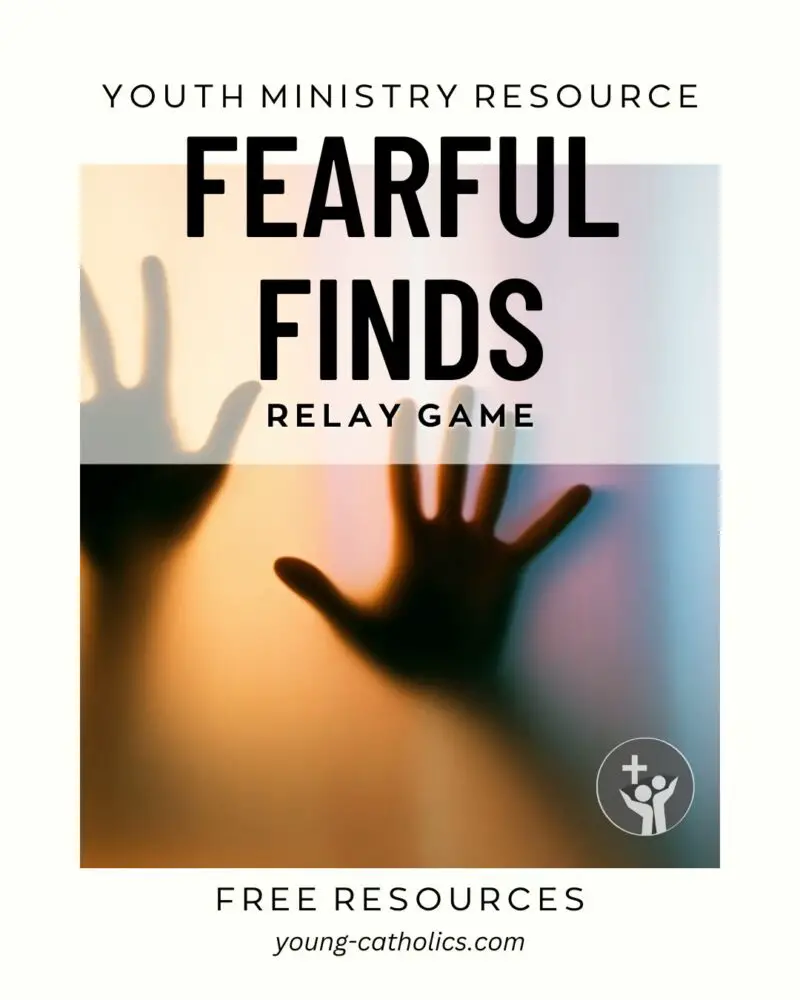
Fearful Finds Relay
The Fearful Finds relay game is designed to challenge participants to confront their fears by searching for coins hidden in a box filled with unsettling textures. Teams of five dive into containers layered with cooked spaghetti, pudding, soft candy, and potting soil to retrieve five coins, facing the unknown with each reach.
This activity not only sparks laughter and teamwork but also prompts a deeper reflection on personal fears and the role of faith in overcoming them. Following the game, discussion questions encourage players to share their experiences and explore how their faith can support them in facing and overcoming fears in life.

Tangled Web
The Tangled Web Game uses a ball of string to create a web among a group of players. As each person answers a question and holds on to the string, the web grows. Later, they work together to untangle it. The game teaches teamwork, listening, and problem-solving. It’s simple but makes a big impact.
This game works well for youth ministry because it can show how sin and dishonesty tangle our lives. A variation includes players letting go of the string if caught in a lie, showing how deceit creates a bigger mess. It connects to themes of honesty, forgiveness, and the effects our actions have on others.

Spread the Good News
The Spread the Good News game reinforces the importance of clear communication and evangelization. By playing the game, youth can learn how to communicate more effectively and ensure that the message of the gospel is not lost or distorted in the process.
It can be used as an icebreaker to help youth get to know each other better or as a knowledge and teaching game to reinforce key themes related to evangelization. The game can be used to foster a sense of community, deepen faith, and provide a fun and engaging way for youth to learn about the importance of sharing the good news of the gospel message.

Create a Reusable Jeopardy Game Board
The Reusable Jeopardy Game is a fun and simple way to help youth learn about their faith. It uses familiar Jeopardy-style rules to ask questions on topics like Bible stories, saints, and Christian living. Teams choose questions from a board and earn points by answering them correctly. This encourages learning, teamwork, and friendly competition.
This game is great for youth ministry, VBS, or church retreats. It helps reinforce lessons in a creative way and gets everyone involved. You can reuse the game by changing questions and categories for different sessions. It’s a useful tool for teaching important truths in a format that is fun and easy to set up.
Seeing the Big Picture
Seeing the Big Picture is a guessing game that helps youth understand how limited our view can be. Players try to identify images that start out blurry or zoomed in. It’s harder than it seems, and that’s the point. The game shows how we can miss what God is doing when we only see part of the picture.
This game works well with themes like discernment, listening to the Holy Spirit, or trusting the Church’s teachings. It helps youth think about how God sees more than we do and reminds them to stay open when things don’t make sense right away. It’s also fun, fast-paced, and easy to run in a group setting.

Graceful Strides Relay
Graceful Strides Relay is a relay race with a twist. Each team member takes steps of different sizes, from very small to very large. This setup reflects the parable of the workers in Matthew 20:1–16, where everyone is paid the same no matter how long they worked. The game helps youth explore how grace and fairness are not always the same thing.
This game works well with youth ministry themes like grace, equality, and God’s generosity. It gets youth thinking about how we often compare efforts and rewards, but God looks at things differently. The game leads to good conversation about how God gives freely, no matter our past or how much we’ve done.

Ten Commandments Dice Game
The Ten Commandments Dice Game is a fun way to help children learn and remember the Ten Commandments. Using wooden dice marked with numbers and a cross, kids roll and match the number to a commandment. This helps them connect the commandments with daily life in a simple and hands-on way. It’s a great tool for VBS, religion class, or youth group.
This game can be used with themes like God’s law, obedience, and moral choices. For younger kids, it’s a memory tool. For older youth, it can lead to deeper talks about how we follow God’s commandments today. The game mixes fun and faith to make learning more meaningful.

Pathway to Change
The “Pathway to Change” game is a dynamic, interactive activity designed to introduce themes of repentance and transformation to youth groups. Participants navigate an obstacle course, engaging with reflective questions and actions related to personal growth and spiritual change. Materials include simple items like cones, ropes, and index cards with prompts that encourage introspection on virtues, challenges, and faith.
It serves as an effective icebreaker and a profound way to explore the journey towards becoming closer to Jesus, making it an ideal exercise for youth ministry sessions, particularly those focusing on themes of Lent and personal conversion.

Survival Skills Game
The Survival Skills Game helps youth think about what is truly needed in hard times. Players pick items to take on a long journey after a disaster. Each item has a point value. After choosing, they see how well they would survive. It encourages thinking, teamwork, and planning.
This game can connect to themes like trust in God, community, and spiritual readiness. Just as we need certain things to survive a disaster, we also need Jesus and each other to face life’s struggles. It reminds us we can’t do everything alone and opens the door to talk about faith, support, and being ready to follow Christ.
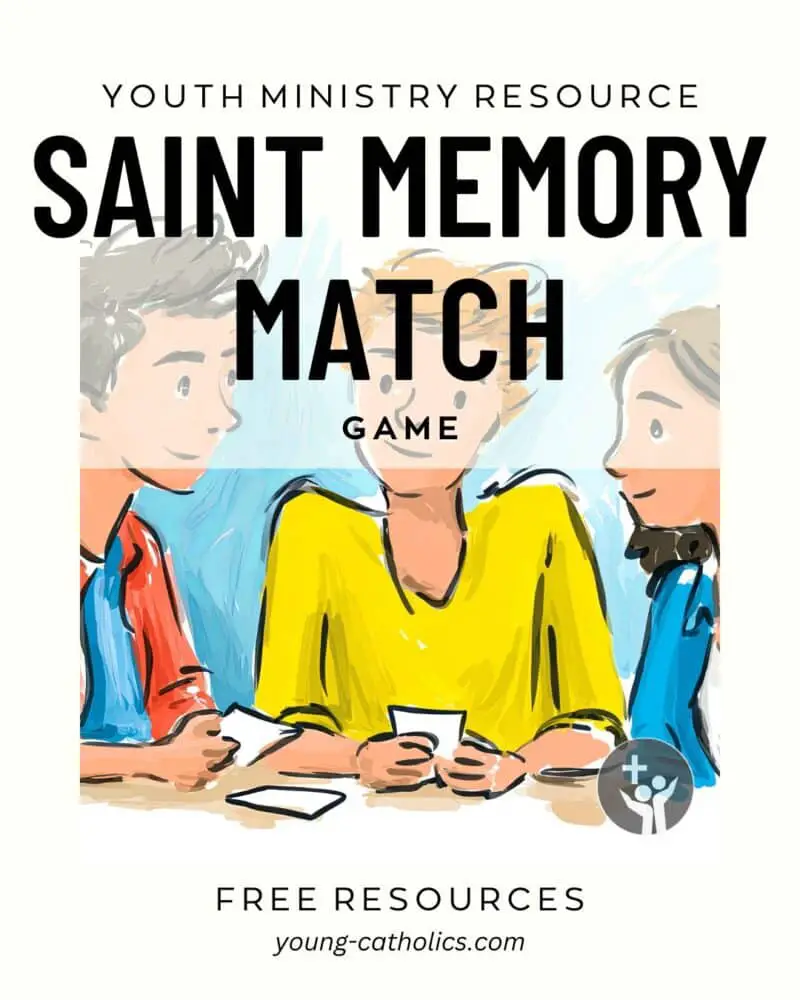
Saint Memory Match Game
The Saint Memory Match Game game helps youth learn about Catholic saints in a fun and hands-on way. Players match saint cards with facts about their lives. It helps youth remember who the saints were and what made them holy. The game works well for both kids and teens.
This game fits into many youth ministry themes. It can be used to talk about holiness, the Communion of Saints, and vocation. It’s also a great activity for All Saints Day. The game is simple to prepare and easy to play in groups of any size.
A printable set of cards is provided.

Bible Scavenger Hunt
The Bible Scavenger Hunt game helps kids learn how to use their Bibles while having fun. Teams look up Bible verses and search for real-world items mentioned in the text. It gets them moving, thinking, and reading Scripture in a hands-on way.
This game works well with themes like creation, God’s Word, and how God is present in everyday life. It fits youth group meetings, retreats, and Vacation Bible School. It also helps youth connect Bible stories to the world around them.

Whose Voice Is It? Game
The Whose Voice Is It game helps youth learn to listen carefully. One person hides their identity with a disguised voice, and the others try to guess who it is. It’s fun, fast, and full of laughter.
This game fits well with themes like hearing God’s voice, trust, and paying attention. It also helps prepare the group for deeper talks about faith. It works well at the start of a session to break the ice and get everyone involved.
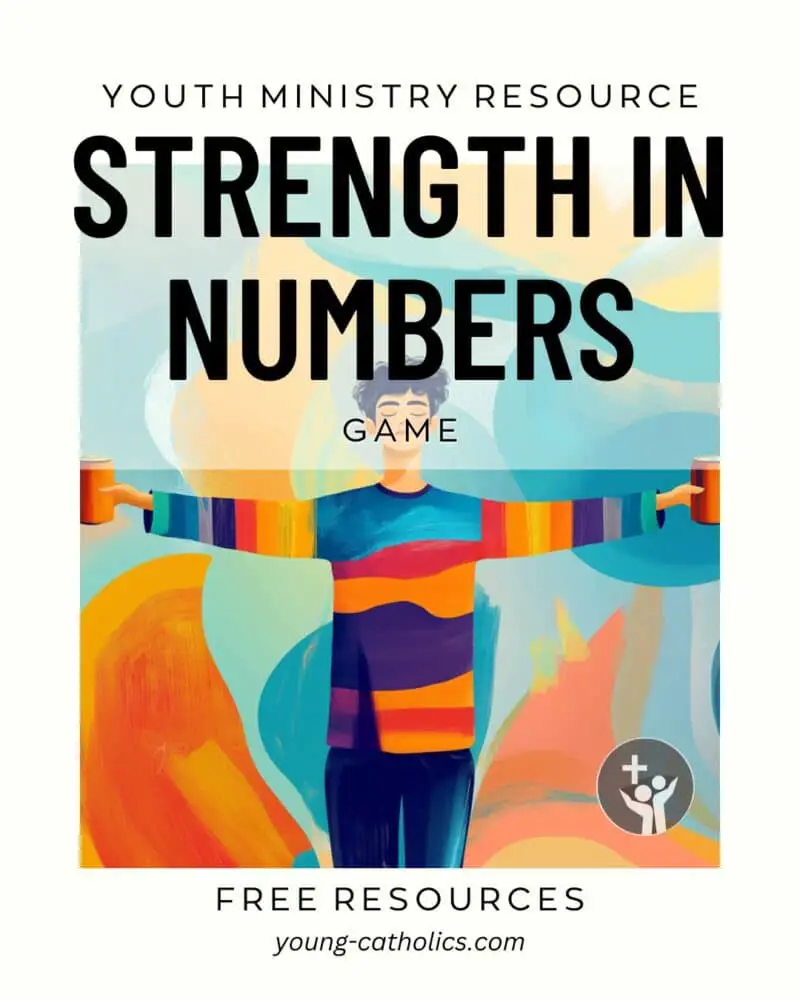
Strength in Numbers
Strength in Numbers is a hands-on group game that shows how hard things become easier when we work together. Players first try to hold heavy cans by themselves, then repeat the task with help from friends. The game ends with a fun team challenge using shopping bags full of cans. It encourages cooperation and teaches that supporting each other makes a real difference.
This activity works well with youth ministry themes like community, service, and asking for help. It opens the door for honest conversation about when we need others and how we can be there for someone else. It also includes a service project, since the canned goods can be donated after the game.
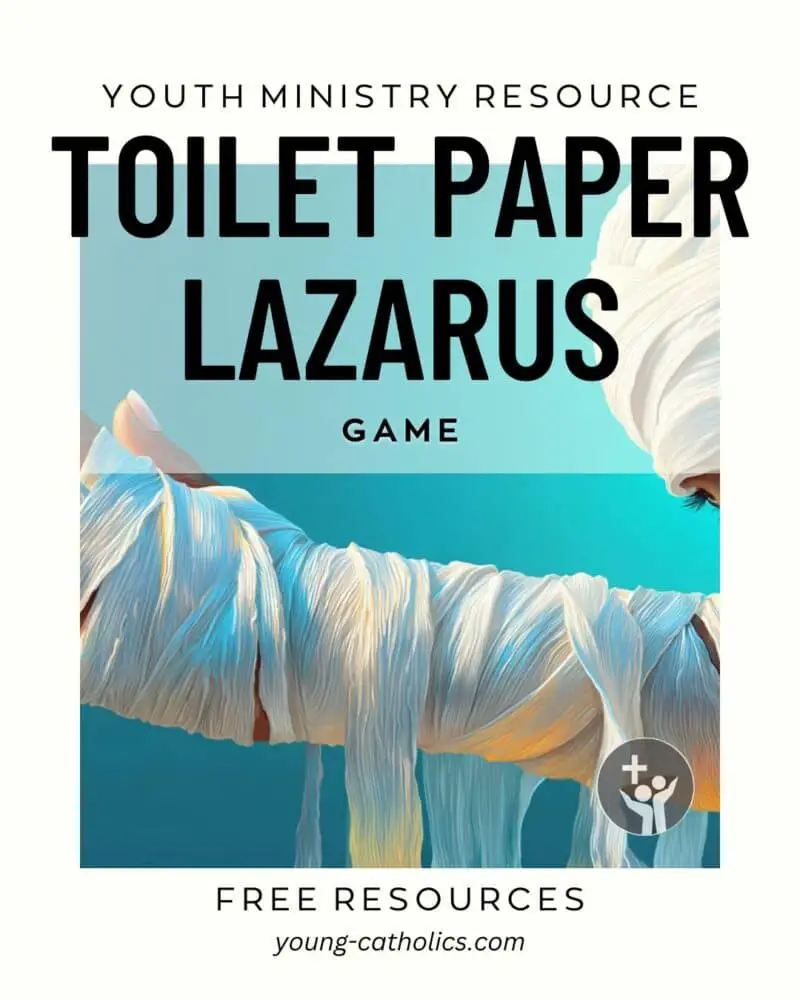
Toilet Paper Lazarus
The Toilet Paper Lazarus game is a fun way to explore the story of the raising of Lazarus from John 11. Youth wrap a teammate in toilet paper to act out Lazarus coming out of the tomb. It’s a silly way to remember a serious moment.
This activity fits lessons about new life, faith in Jesus, and the power of His words. It works well during Lent or any time you want to show that faith can be active and fun. Reflection questions afterward help bring out the meaning of the Gospel story.
Just for Fun
- Extreme War
- Show Me the Money
- Silly Sentence Game
- Glow in the Dark Ring Toss
- Medusa
- Ships and Sailors
- Drip Drip Drop
- Melt My Ice Heart
- Mingle
- Emotion in Motion
- Talent Comm – A Talent Game
- Sculptionary
- Animal Sounds
- Egg-Chicken-Dinosaur (Evolution)
- Tick-Tock the Crocodile Hunt
- Ah So Co
- Simon Says – The Balloon Edition
- Treasure Islands
- Psychiatrist
- Buried Treasure
- Water Drop Race
- Hook the Treasure
- Fish Bowl Toss
- Ninja
- Fight the Bite Secret Tag
- Davy Jones Locker
- The Boat is Sinking
- Pictionary
- Pair Off Square Off
- Glow in the Dark Twister
- Treasure Hunt

Extreme War
The Extreme War Card Game is a quick and fun activity for youth groups. It encourages decision-making, focus, and friendly competition. Players choose cards to beat others in their group, moving to the next round as they win. The game is easy to play and includes everyone.
This game can tie into youth ministry themes like trust, choices, and faith in God’s plan. It helps young people reflect on biblical stories like David and Goliath or Abraham’s trust in God. It’s perfect for retreats, youth nights, or group gatherings where connection and faith can grow.
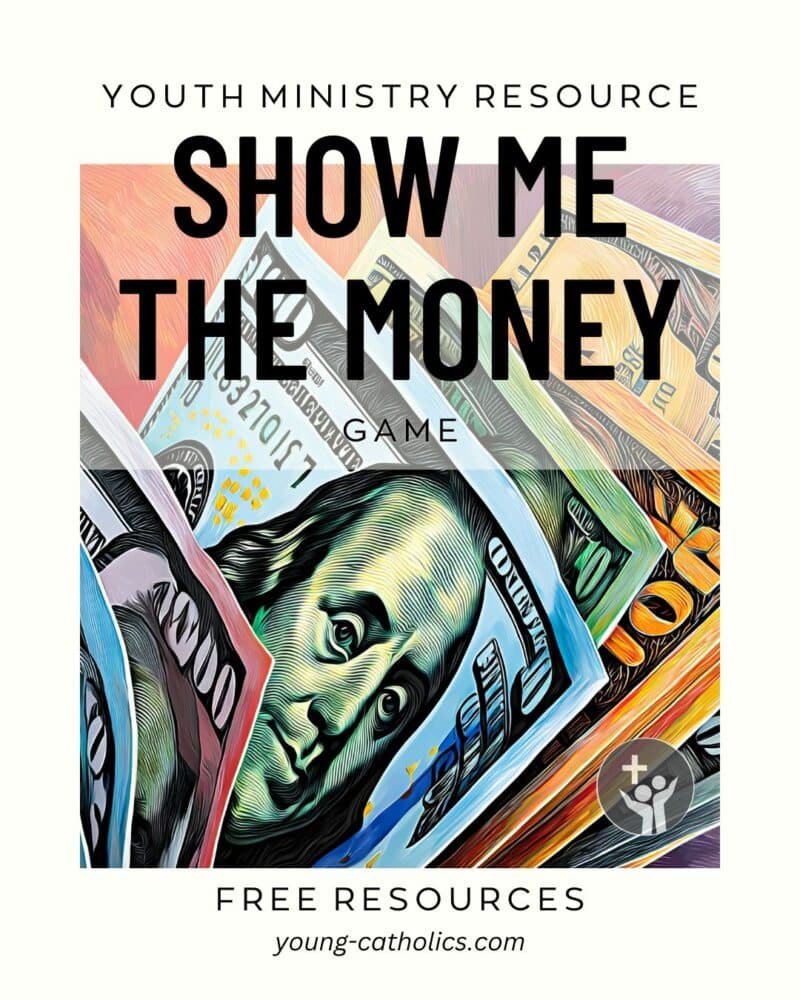
Show Me the Money
Show Me the Money is a fun and active game where players use pretend money to bet on quick games like rock-paper-scissors or coin tosses. It teaches smart decision-making, risk-taking, and good sportsmanship. Youth practice thinking ahead, managing what they have, and learning how to win or lose with kindness.
This game also ties into faith lessons. It connects to Bible themes like stewardship, trust in God, and avoiding greed. Youth can learn that it’s not just about winning but about using what they have with care and sharing joy with others. It’s a simple way to reflect on deeper truths while having fun.

Silly Sentence Game
The Silly Sentence game is a fun and simple activity where players build a sentence one word at a time. It works as an icebreaker and helps youth groups laugh and connect.
The game encourages creativity and active listening. It can also teach that God works in unexpected ways, just like the sentences take surprising turns. It fits well with themes like God’s Word, creativity, or trusting in God’s surprises. The focus is on joy and shared fun.

Glow in the Dark Ring Toss
Glow in the Dark Ring Toss is a vibrant and engaging game perfect for youth ministry events, Vacation Bible Schools, or family fun nights. It involves tossing glowing bracelets onto matching colored, glow stick-lit water bottles in a darkened room or outdoor night setting. Easy to set up with just glow sticks, empty water bottles, and a bit of darkness, it’s a game that combines skill, fun, and a touch of strategy.
Glow in the Dark Ring Toss not only entertains but can also illuminate spiritual themes such as letting your light shine and the guidance of God’s light, making it a memorable and meaningful activity for all ages.

Medusa
Medusa is a fun and fast-paced game that works well as an icebreaker or energizer. Players stand in a circle, look down, and on a signal, look up and try to make eye contact with someone. If two players lock eyes, they “turn to stone” and fall down dramatically. The game continues until only a few players are left.
This game helps youth practice focus, awareness, and quick thinking. It also builds community through laughter and shared fun. Medusa can connect to faith by reminding players that what we focus on matters. Just like avoiding the wrong gaze in the game, we need to keep our eyes on God in life.
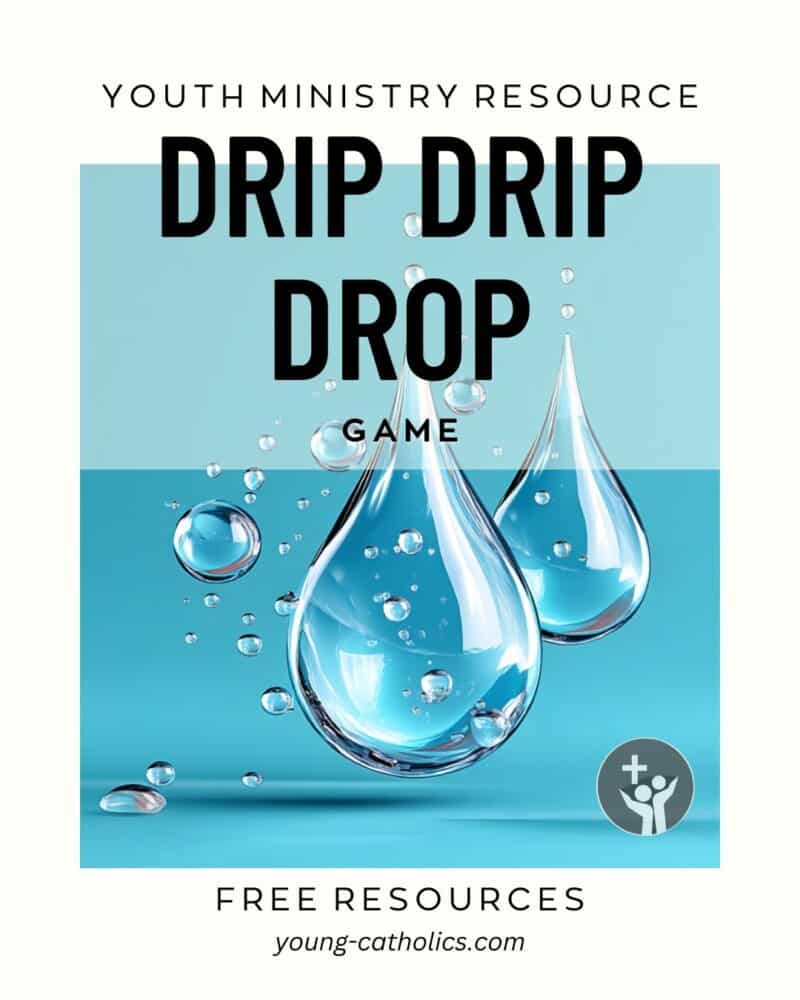
Drip Drip Drop
Drip Drip Drop is a fun and simple water game based on “Duck Duck Goose.” One player walks around the circle dripping water on others until they choose one person to pour the rest on. That person then chases the first player to try to tag them before they sit down. It’s a great game for hot weather and works well with large groups.
This game builds community, laughter, and friendship. It can also connect to faith themes like baptism, forgiveness, and renewal. The water can remind youth of how God washes us clean. It also teaches fairness, kindness, and joy through play.
Ships and Sailors
Ships and Sailors is a fun and fast-paced game that builds listening skills, teamwork, and quick thinking. One player acts as the captain, calling out commands that the others must follow. Some commands are for individuals, and others require groups. If a player doesn’t follow the command correctly or fast enough, they are out.
This game works well for Vacation Bible School, camps, or youth group gatherings. It can connect to themes like obedience, community, and leadership. Just as sailors must follow their captain, we are called to listen and follow Christ. It’s also a fun way to build friendships and learn to work together.
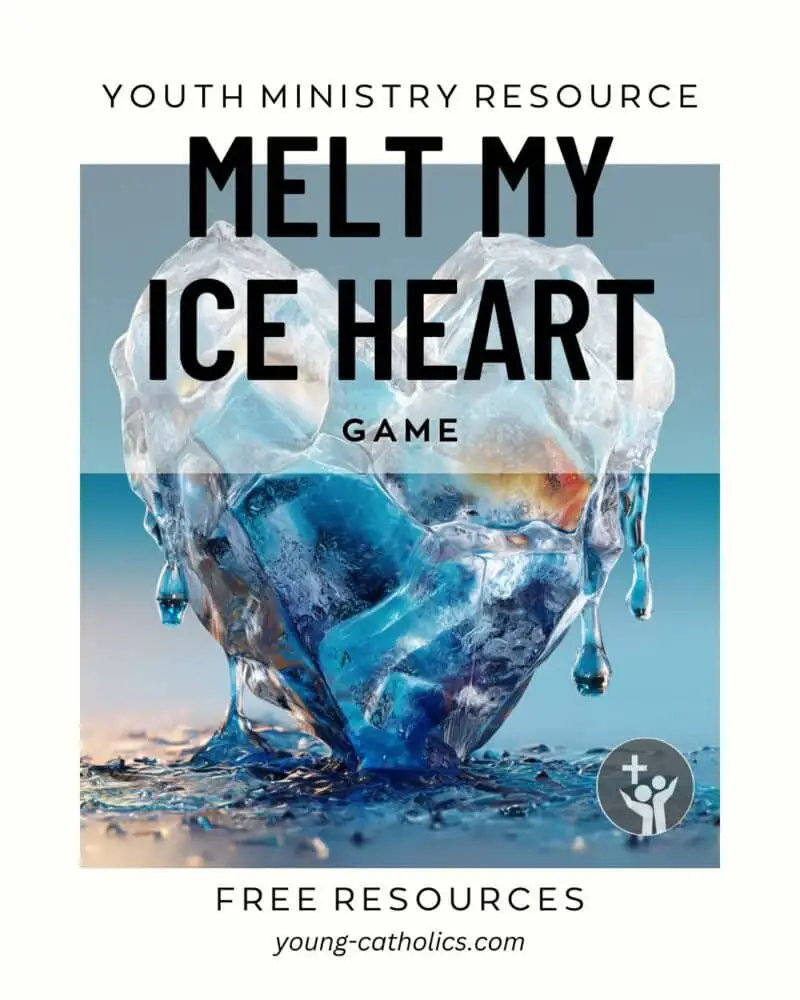
Melt My Ice Heart
Melt My Ice Heart is a silly and fun game where teams race to melt a large ice cube using only their bodies. Teens can hold it, sit on it, or use their armpits to melt it faster. Each team gets towels to help with the mess. The first team to melt their ice completely wins.
This game can be used just for fun or with a lesson on stubbornness, belief, or softening our hearts to God. It’s a good way to start a discussion about how God can melt a hard heart with love and patience. It also builds teamwork and helps teens laugh and connect.

Mingle
The Mingle game is a fun and easy icebreaker that helps youth connect and feel comfortable. Players walk around and quickly form groups based on the numbers called out by the leader. The fast pace keeps everyone moving and engaged. It’s a great way to start a meeting or event with energy and laughter.
This game can also highlight youth ministry themes like responding to God’s call and being open to new experiences. It reminds participants of how we are called to listen, move, and take action in faith. The game encourages interaction, movement, and joy, setting a positive tone for the rest of the day.

Emotion in Motion
The Emotion in Motion game helps youth explore and express emotions using facial expressions. Players pass emotions around a circle, learning about feelings and how they connect to communication. This game is fun, easy to play, and works for any size group.
It fits well with youth ministry themes like understanding emotions in Biblical stories or reflecting on how Jesus showed compassion and joy. It also encourages self-awareness and empathy in a playful setting. The game is a great way to bring energy and meaningful lessons to your group.
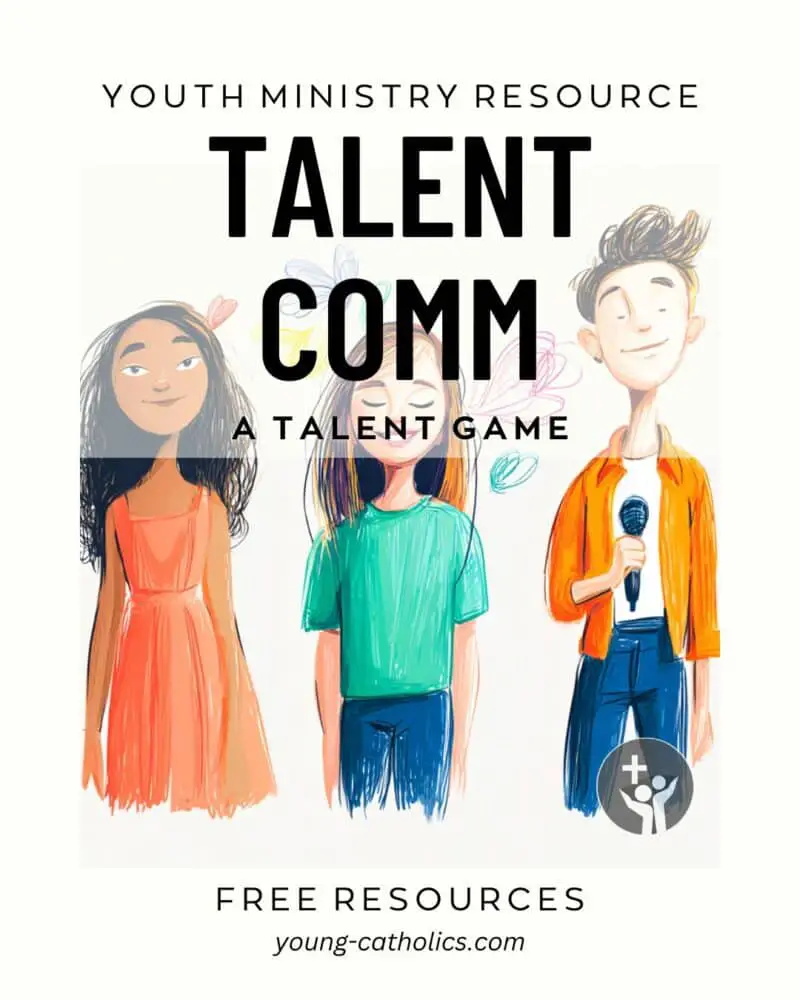
Talent Comm – A Talent Game
The Talent Comm Talent game is a fun and creative activity that helps youth discover their unique gifts. Players act, draw, or describe words while their team tries to guess them. This game encourages participants to use their talents in ways that reflect Biblical themes, like using God’s gifts or being part of the Body of Christ.
It can fit into youth ministry themes such as the Parable of the Talents, teamwork in faith, or exploring creativity as a gift from God. This interactive game makes faith lessons engaging and helps youth build confidence while having fun together.
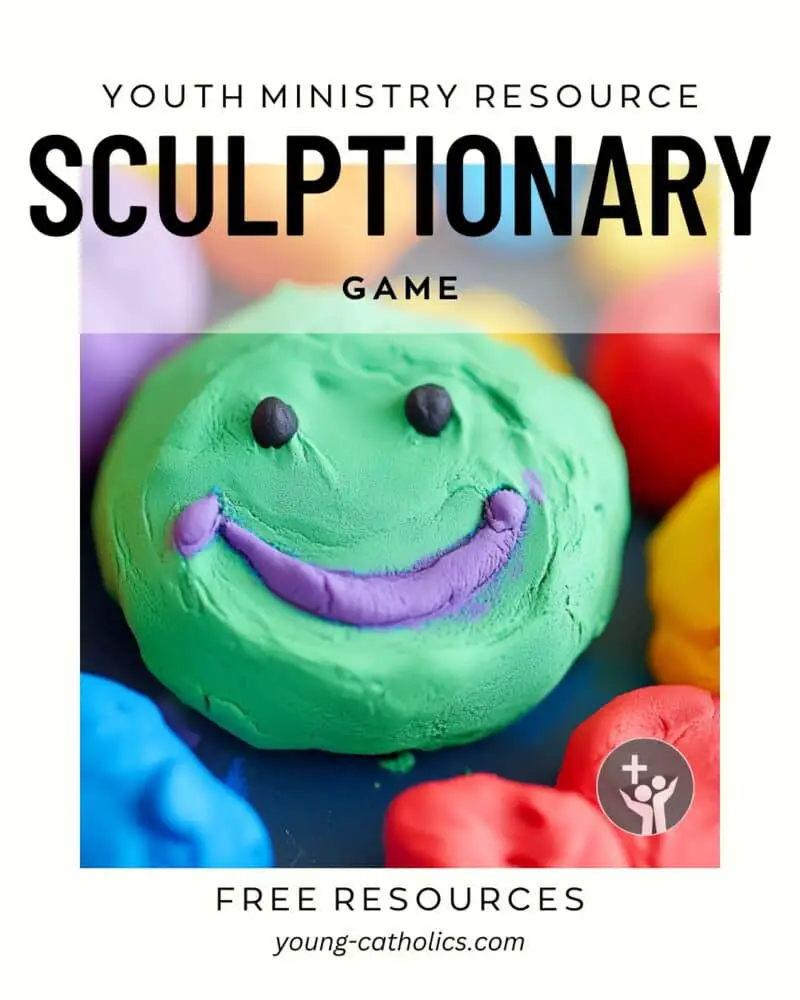
Sculptionary
Sculptionary is a fun, hands-on game where teams guess words or phrases based on what one player sculpts using clay or dough. It helps youth work together, communicate, and laugh while building trust and friendship. The sculptor cannot speak or use letters, so the team must pay close attention and think creatively to guess the word.
This game is great for youth ministry because it can be tied to Bible stories, virtues, or Catholic teachings. Words like “baptism,” “forgiveness,” or “Noah’s Ark” can help youth reflect on their faith while having fun. It encourages learning through play and helps make Scripture and Church teachings more real and memorable.
Animal Sounds
Animal Sounds is a fun and silly icebreaker game where each player is given an animal name and must find their match by making that animal’s sound—while blindfolded! Players walk around, making their sounds until they find someone who sounds the same. When they think they’ve found a match, they raise their hands and the leader checks if they’re correct.
This game helps break the ice and gets everyone laughing. It also builds trust, since players must work without sight and rely on sound and listening. It fits well with youth ministry themes like community, listening, and learning to notice others in new ways—just like we learn to listen for God in different ways.
Egg-Chicken-Dinosaur (Evolution)
Egg-Chicken-Dinosaur is a fast-paced and funny game that uses Rock-Paper-Scissors to move through stages of “evolution.” Everyone starts as an egg and must act like one. Players find others of the same type and play Rock-Paper-Scissors. Winners move up a stage (egg to chicken, chicken to dinosaur, and so on), while losers move down a stage.
This game is great for large groups and encourages movement, quick thinking, and interaction. It can also tie into youth ministry themes like growth, change, and how we mature in faith. Use it with a lesson on the Catholic view of science and faith or Pope Francis’ words about each stage of life being a time to believe, hope, and love.

Tick-Tock the Crocodile Hunt
Tick-Tock the Crocodile Hunt game is a fun hide-and-seek activity for catechesis. One player, Captain Hook, listens for the ticking sound of a hidden crocodile to find it before time runs out.
This game teaches focus, calmness, and listening skills while tying into themes of fear, trust, and faith in God. It’s perfect for small groups, pirate-themed events, or lessons on courage. It helps youth connect Biblical stories, like David and Goliath or Peter walking on water, to real-life challenges.

Ah So Co
The Ah So Co game is a fast-paced circle game that uses simple motions and short words. It helps youth pay attention, listen carefully, and think fast. This game is great for Catholic youth groups, VBS, and retreats.
Use the game to tie in themes like listening to God, following directions, or matching words with actions. It fits well with lessons about Samuel, Mary, or the disciples. No supplies are needed, and it works with any group of six or more.

Simon Says – The Balloon Edition
This Simon Says Balloon Game is a fun twist on the classic Simon Says game, designed to teach youth about listening, obedience, and focus. Played in pairs with a balloon between them, youth must carefully follow instructions starting with “Simon Says” while keeping the balloon in place.
This activity is perfect for youth ministry themes like obedience, trust, and cooperation. It helps participants learn the importance of following instructions, just as we are called to follow the Church’s teachings. The balloon challenge adds a reminder about staying mindful and avoiding distractions as we try to keep our faith strong.

Treasure Islands
Treasure Islands is a fun and active game like Musical Chairs, but with decorated poster board “islands” instead of chairs. Players move around while music plays and quickly find an island when the music stops. One player is out each round, and the game continues until only one remains. It teaches quick thinking, movement, and teamwork. Even those who are out can help run the game.
This game connects well to youth ministry themes. It can represent trusting God to guide us, like finding a safe place during life’s journey. The islands can remind youth of places in the Bible where God protected His people. The game also shows the importance of being ready to respond to God’s call. Treasure Islands is easy to set up, encourages creativity, and gives leaders a way to blend faith and fun in one simple activity.
Psychiatrist
Psychiatrist is a fun icebreaker game for youth groups. One player leaves the room while the group agrees on a silly “problem” they will all pretend to have. The psychiatrist returns and asks questions to figure it out. Everyone must answer based on the fake problem, not real life. If someone messes up, the group yells “Psychiatrist!” and switches seats, making it harder to solve the mystery.
This game helps youth learn to listen closely and think creatively. It also encourages laughter, teamwork, and paying attention to others. It fits well in youth ministry as a way to build community and get people comfortable with each other. You can connect it to themes like understanding others, noticing what’s beneath the surface, or being part of the Body of Christ. Everyone has a part, and the group works together toward one goal.
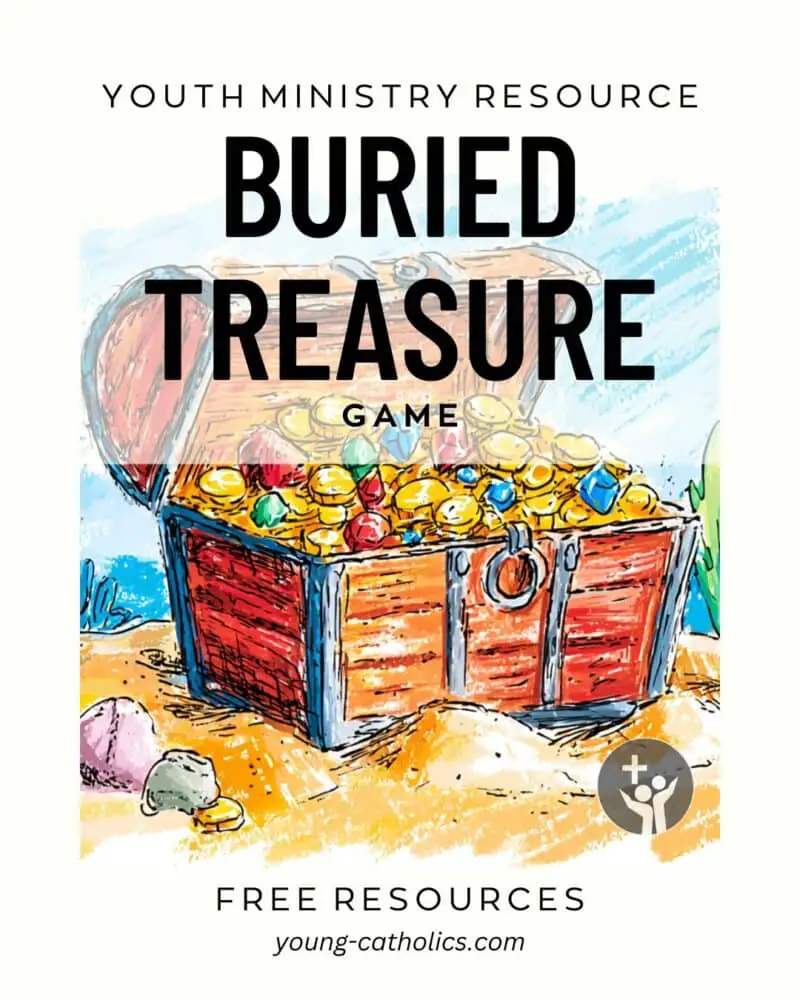
Buried Treasure
The Buried Treasure game is a fun, hands-on activity where youth dig through sand to find hidden treasures. The goal is to work together to uncover as much “treasure” as possible within a set time.
This game is ideal for youth ministry because it encourages patience, focus, and the joy of discovery, which connect to faith themes like God’s hidden blessings and seeking His kingdom. Simple to set up and engaging for groups, the Buried Treasure game is a great way to build positive experiences in any youth setting.
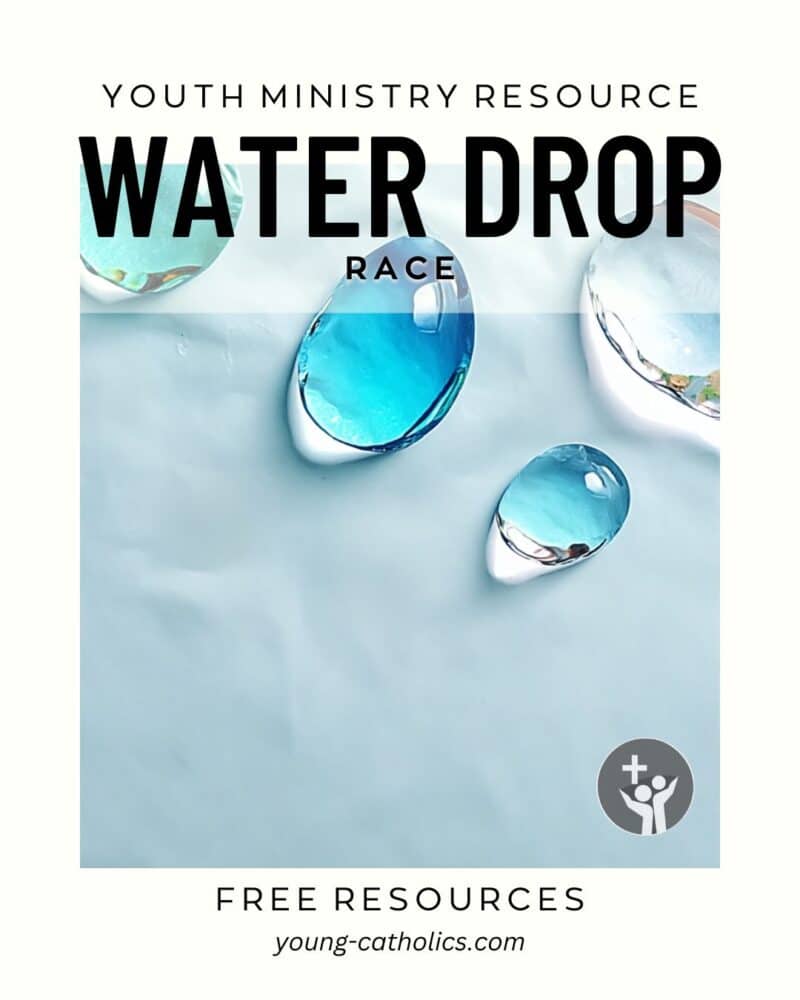
Water Drop Race
Water Drop Race is a simple and fun game where players blow a water drop across wax paper. It teaches patience, focus, and gentle control. If they blow too hard, the drop splits. This makes players slow down and think, which can help with self-control in other areas of life. It works well indoors and is great for all ages at youth group or VBS.
The game can connect to faith themes like baptism and God’s guidance. The water drop staying together can show how we need each other in community. It also reminds us that God moves us forward with grace, just like the drop moves with a gentle breath. Leaders can use this game to talk about unity, trust, and how God leads us in quiet ways. It’s a fun and visual way to explore deep truths.

Hook the Treasure
Hook the Treasure is a fun team game where kids use homemade hooks to pick up and carry small treasures to a chest. It’s great for a pirate-themed VBS or youth camp. The game builds hand-eye coordination and encourages teamwork. Players must work together, cheer each other on, and stay focused. It can be played indoors or outdoors and works well with many age groups.
This game connects to faith themes like seeking God, unity in the Body of Christ, and perseverance. Just as children search for treasure, we are called to seek God’s love and truth. Working together reminds us we are one Church, with each person playing a role. The effort needed to hook the treasure teaches patience and trust in the process. Hook the Treasure helps kids learn these values through play, making faith lessons easy to understand and remember.

Fish Bowl Toss
Fish Bowl Toss is a fun carnival-style game that works well at youth ministry events or VBS. Players toss ping pong balls into fish bowls, trying to land one in a bowl with a plastic fish. If they succeed, they win a prize like a toy fish or candy. It’s a great way to build hand-eye coordination and bring energy to a group event. The game is easy to set up and can be adjusted for different age groups.
This game also teaches patience and persistence. Players learn that not every try leads to success, but trying again is part of the fun. It fits well with themes like joy, community, or seeking God with our whole heart. Like the toss, faith takes practice, and we grow through each try. Fish Bowl Toss brings laughter and friendly competition while helping youth build confidence and enjoy being part of the group.

Ninja
Ninja is a fast-paced game that gets youth moving and laughing. Players stand in a circle and take turns trying to swipe at each other’s hands using only one motion and one step. After each move, they must freeze in place. If a hand is hit, it’s out. Once both hands are out, the player is out of the game. The game continues until only one ninja remains.
This game works well as a warm-up or time filler in youth ministry. It builds focus, quick thinking, and awareness of others. Ninja can also be tied to themes like self-control, perseverance, or spiritual alertness. Just like in the game, we are called to be alert in our faith and careful with our actions. Ninja is simple, fun, and encourages community through playful competition.

Fight the Bite Secret Tag
Fight the Bite Secret Tag is a fun and engaging game for youth groups. Players secretly tag each other with red dot stickers while trying not to get caught. The purpose of the game is to develop social skills, teamwork, and honesty. If caught, players keep the sticker and take an extra one.
This game is perfect for youth ministry, teaching themes like watchfulness, integrity, and patience. It helps build community and create joyful memories. Use it at your next event to bring fun and important lessons to your group.

Davy Jones Locker
Davy Jones Locker is a simple and fun fishing game for kids at VBS or church camp. Children use homemade fishing poles with magnets to “rescue” pirate figures and treasures from a kiddie pool. It’s easy to set up and works well for all ages. Even the youngest kids can take part and enjoy the surprise of what they catch. The game helps kids use their hands and encourages teamwork.
This game also connects to youth ministry themes like rescue and redemption. Just like the kids pull treasures from the “sea,” Jesus rescues us and brings us into His love. It’s a playful way to remind children that God values each person and wants to save them. The game can lead to simple lessons about being saved, helping others, and God’s care for all. It’s a great mix of fun, faith, and imagination.

The Boat is Sinking
The Boat is Sinking is a fun and fast-paced icebreaker. Players must quickly form groups based on the number called out by the captain. Anyone left out answers a question about themselves. This helps youth learn more about each other in an active way.
This can be used in youth ministry to connect with faith themes. It can remind players of trusting in Jesus, being ready for God’s call, and making good choices. It also helps develop listening and decision-making skills. This is a great way to bring energy and fun to any youth group.
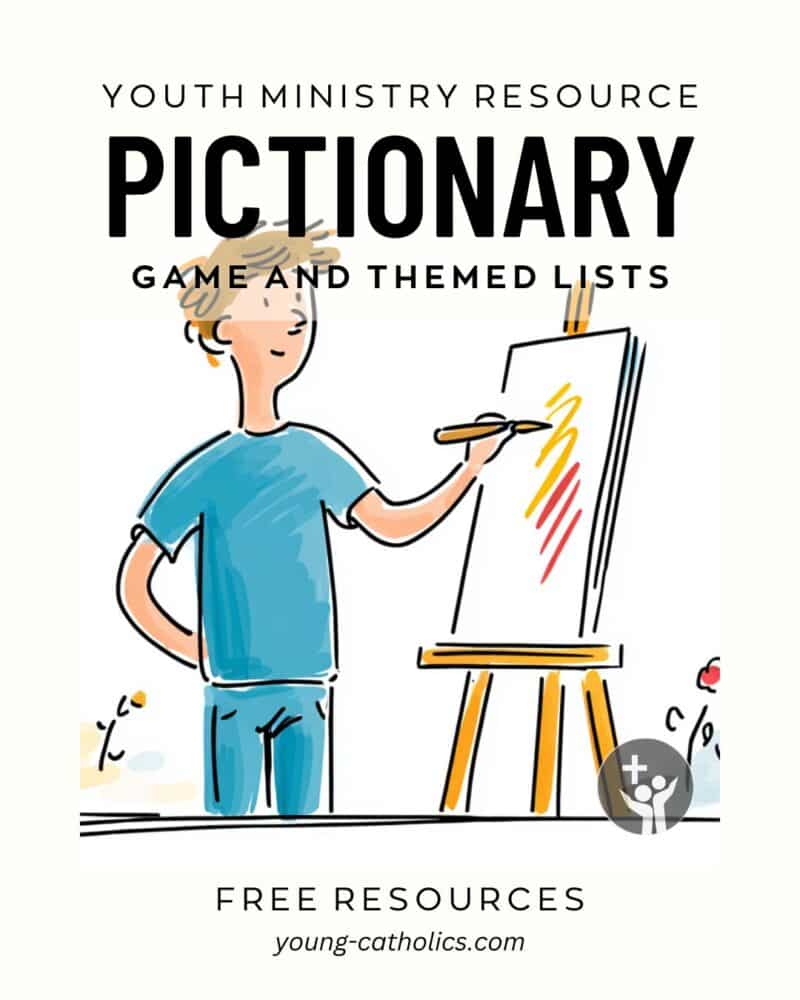
Pictionary
Pictionary is a fun and creative game that helps teens connect, laugh, and learn together. Players take turns drawing words or phrases while their team tries to guess what it is. The game encourages teamwork, communication, and quick thinking. It’s easy to set up and can be adapted for any group size or meeting theme.
In youth ministry, Pictionary works well with Bible stories, virtues, or Church teachings. Teens can draw scenes like Noah’s Ark or symbols like the cross. This helps them remember key parts of their faith while having fun. The game also supports values like community and cooperation. It’s a simple way to make learning about faith more active and meaningful.

Pair Off Square Off
Pair Off Square Off is a fun icebreaker that helps teens get to know each other. Each person has a famous name or character taped to their back. They must ask yes-or-no questions to figure out who they are, then find their matching partner. Once both know their identities, they sit down together. The game ends when everyone finds their pair.
This game is great for starting youth group meetings. It encourages talking, teamwork, and laughter. You can use pairs from the Bible, like Mary and Joseph or David and Goliath, to connect it to faith themes. It helps teens feel welcome and included, especially if they’re new.
Glow in the Dark Twister
Glow in the Dark Twister is a fun and active game that puts a new spin on the classic Twister. It uses glow-in-the-dark chalk or paint to create a glowing game board for indoor or outdoor play. The game is great for youth groups, camps, or VBS nights. It gets teens moving, laughing, and working together in a playful and creative way.
This game can also connect to a faith theme like GLOW—God Lights Our Way. As players move in the dark guided by glowing colors, they can reflect on how God’s light helps guide them through life. It’s a reminder that even in confusion or challenge, God is always with us.
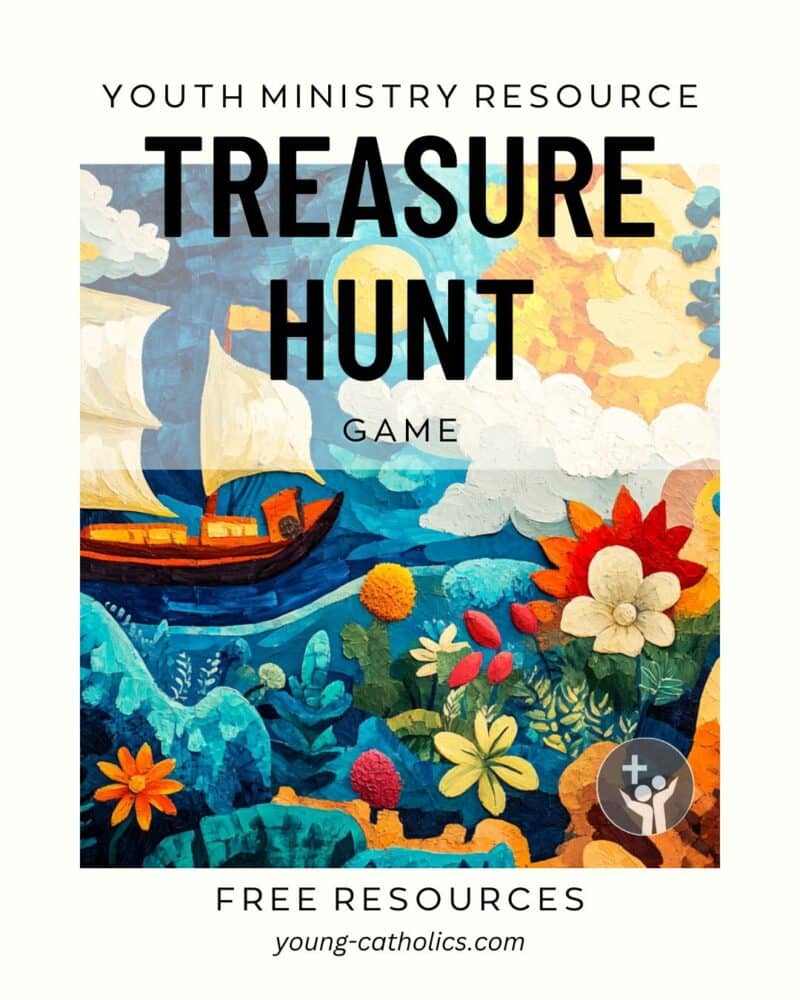
Treasure Hunt
The Treasure Hunt game is a fun and simple way to engage youth in learning about their faith. Players search for hidden treasures like chocolate coins or small treats.
This activity can connect to themes such as seeking God’s kingdom, discovering His blessings, or finding wisdom. It’s a great choice for youth ministry because it combines fun with meaningful lessons. The game also encourages skills like problem-solving and observation. Whether indoors or outdoors, this game adds excitement and faith-based reflection to any gathering.
Games for Specific Holy Days, Seasons, and Holidays

Could You Give It Up Game
The Could You Give It Up? game helps youth reflect on sacrifice and self-control. Players take turns saying what they could give up for Lent. Others must lower a finger if they could not give it up. The last player with fingers still raised wins. This game encourages honesty and helps youth see what they value most.
This game can be used with themes like detachment, fasting, and trusting God. It connects to Bible stories like the rich young man and Jesus’ time in the desert. It is a fun way to start discussions about Lent and faith. Youth will enjoy the challenge while thinking about their spiritual journey.
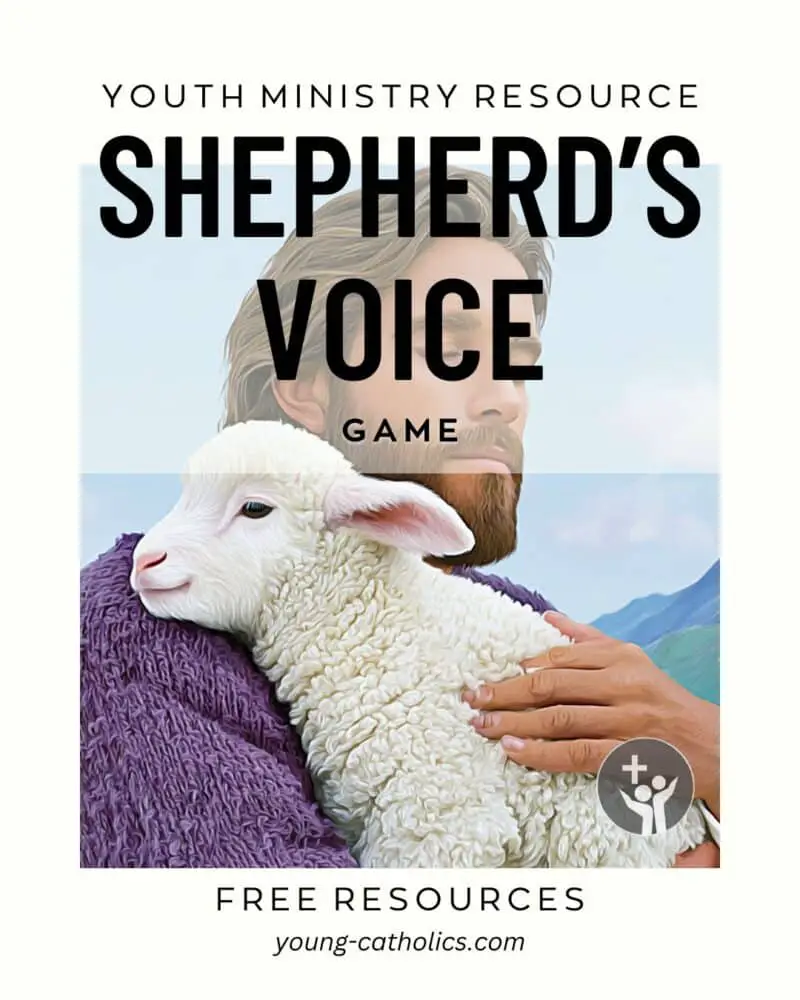
Shepherd’s Voice
Shepherd’s Voice is a listening and trust game for youth groups. Blindfolded players (the sheep) try to reach their shepherd by listening only to their voice. The shepherd cannot move, so the sheep must focus and ignore other sounds. This game teaches how to listen carefully and trust someone to guide you. It works well in lessons about teamwork, trust, and following the right voice.
This game connects to Bible stories like the Good Shepherd in John 10 and Psalm 23. It reminds youth that Jesus is always calling and leading them. It also shows how staying close to others in faith can help us follow God better. The game brings these ideas to life in a fun and meaningful way.
Turkey Hunt Thanksgiving Game
Turkey Hunt is a fast-paced Thanksgiving game that gets youth moving, laughing, and working together. Played in groups of three, it mixes simple commands with fun roles like “trees” and “turkeys.” Players must listen closely and move quickly to avoid becoming “It.” The game helps youth practice quick thinking, listening, and teamwork while having a great time.
This game also ties into themes of faith. It reminds youth that following God’s voice takes attention and action. Just like in the game, we must be ready to move when called. It also teaches perseverance, as players keep going even when they’re tagged or make mistakes. Turkey Hunt adds joy to youth ministry while teaching lessons that last.
Questions and Answers about Youth Ministry Games
What are the benefits of playing these games in youth ministry?
Playing games helps youth build friendships, trust, and a sense of community. It also makes faith lessons more engaging and fun, helping youth connect with important themes in an active way.
Do these games require a lot of preparation?
Most of the games are simple to set up and require little or no materials. Some may need basic supplies like paper, markers, or a ball, but all of them are designed to be easy to organize.
Are these games suitable for all age groups?
Yes! These games are designed for a wide range of ages, from younger children to teens. Many games can be adapted to suit different age groups or group sizes.
Can these games be used in different settings?
Absolutely. These games are perfect for youth ministry events, Vacation Bible School (VBS), church camps, or even small group meetings. They can be played indoors or outdoors, depending on the space available.
How do these games connect to faith themes?
Many of the games are designed to reflect key aspects of Christian faith, such as teamwork, trust, service, and love. Some games are based on Bible stories or faith principles, like the importance of listening to God’s voice or helping others in need.
Can I use these games for a specific holiday or season?
Yes! There are games specifically designed for certain holy days, seasons, and holidays like Advent, Lent, Thanksgiving, and All Saints’ Day. These games can help reinforce faith lessons during these special times.
How do I modify these games for larger groups?
For larger groups, you can divide participants into smaller teams or adjust the rules to include more players. Many of these games can be scaled up by adding extra rounds or making slight rule changes to keep everyone involved.
Can these games help teach leadership skills?
Yes! Many of these games encourage teamwork, communication, and problem-solving, all of which are important leadership skills. Some games specifically highlight the importance of guiding others and making wise decisions, which can help youth develop leadership qualities.
How can I use these games in my youth ministry?
You can use these games as icebreakers to start your meetings, during breaks between lessons, or as a fun activity to reinforce a theme or lesson. They’re also great for energizing the group or ending on a fun note.
Fun, Faith, and Fellowship All in One
Games are a great way to bring youth together, build strong friendships, and make learning about faith enjoyable. Whether you’re using them to break the ice at the start of a meeting or as a fun way to reinforce a lesson, these activities are sure to bring energy and laughter to your youth group. Every game offers something unique, from building teamwork to teaching important life lessons about trust, compassion, and service.
No matter the size or age of your group, these games can be easily adapted to fit your needs. You don’t need a lot of materials or complicated setups to get started—just enthusiasm, a little creativity, and the willingness to have fun. So gather your youth, get ready to play, and see how these games can help create a more connected and faith-filled community.
Your Turn
We hope these games help make your youth ministry events more enjoyable and meaningful. Try a few out at your next meeting and see how your group responds.
We’d love to hear your thoughts, ideas, and any variations you come up with! Share your experiences and suggestions in the comment section below so others can benefit from your creativity. Let’s keep the fun going and make faith-building an adventure for everyone!



Leave a Reply